
The ability to transcend disability
Rachael Johinke has never accepted that blindness will limit her potential.



Rachael Johinke has never accepted that blindness will limit her potential.

Flinders University acknowledges the Traditional Owners and Custodians of the lands on which its campuses are located, these are the Traditional Lands of the Arrernte, Dagoman, First Nations of the South East, First Peoples of the River Murray and Mallee region, Jawoyn, Kaurna, Larrakia, Ngadjuri, Ngarrindjeri, Ramindjeri, Warumungu, Wardaman and Yolngu people. We honour their Elders past, present and emerging.
Progress keeps Flinders University at the forefront of dynamic teaching and high impact research. The physical manifestations of our continued progress are obvious in the form of our new City Campus at Festival Plaza, and the flagship Health and Medical Research Building (HMRB) rising as the centrepiece of our exciting Flinders Village development.
The Flinders City Campus opened its doors in February 2024, offering a wide range of educational programmes in a contemporary, student-focused environment across eight floors of Festival Tower. Almost a thousand students have enrolled at the City Campus in its first year and we expect that number to grow as more students take the opportunity to experience the quality of teaching that Flinders is famous for combined with the convenience of a North Terrace location.
The HMRB is an exceptional research facility that will meet the growing needs of our world class researchers far into the future. This 10-storey building will house more than 600 researchers, clinicians and professional staff dedicated to transforming our understanding, diagnosis and treatment of illness and delivering better health and wellbeing outcomes for the community.
Flinders is also expanding its academic reach with the addition of innovative new courses that will shape the future workforce. By responding quickly to support the AUKUS nuclear-powered submarine pathway announcement, Flinders is the only university in Australia to offer undergraduate nuclear engineering, delivered in partnership with the University of Rhode Island and The University of Manchester. It magnifies Flinders’ growing international reputation as a leader in autonomous maritime research, electronic warfare, biofouling, and artificial intelligence.
This activity complements Flinders’ continually rising performance in research, with total research income in 2023 exceeding $115m.
This places Flinders in the top ten in the country for nationally competitive grant income and in the top eight for health and medical research income. Of course the dollars won by our researchers are but the means to an end, with each grant enabling the pursuit of yet more high impact research, delivering outcomes that help to improve lives in our community and beyond.
We were also very proud to be recognised by Times Higher Education as a global leader in the delivery of the United Nations Sustainable Development Goals. Flinders University was ranked 8th in the world for Gender Equality and 10th in the world for Reducing Inequalities. Anyone who has ever work or studied at Flinders will know that equity of opportunity runs deep in our institution, but this external recognition is something we can all celebrate with pride.
Flinders has also been recognised as a national leader in supporting Indigenous talent, receiving a prestigious Science in Australia Gender Equity (SAGE) Cygnet Award – the first university in South Australia to achieve this accolade – for fostering an inclusive environment for Aboriginal and Torres Strait Islander staff members.
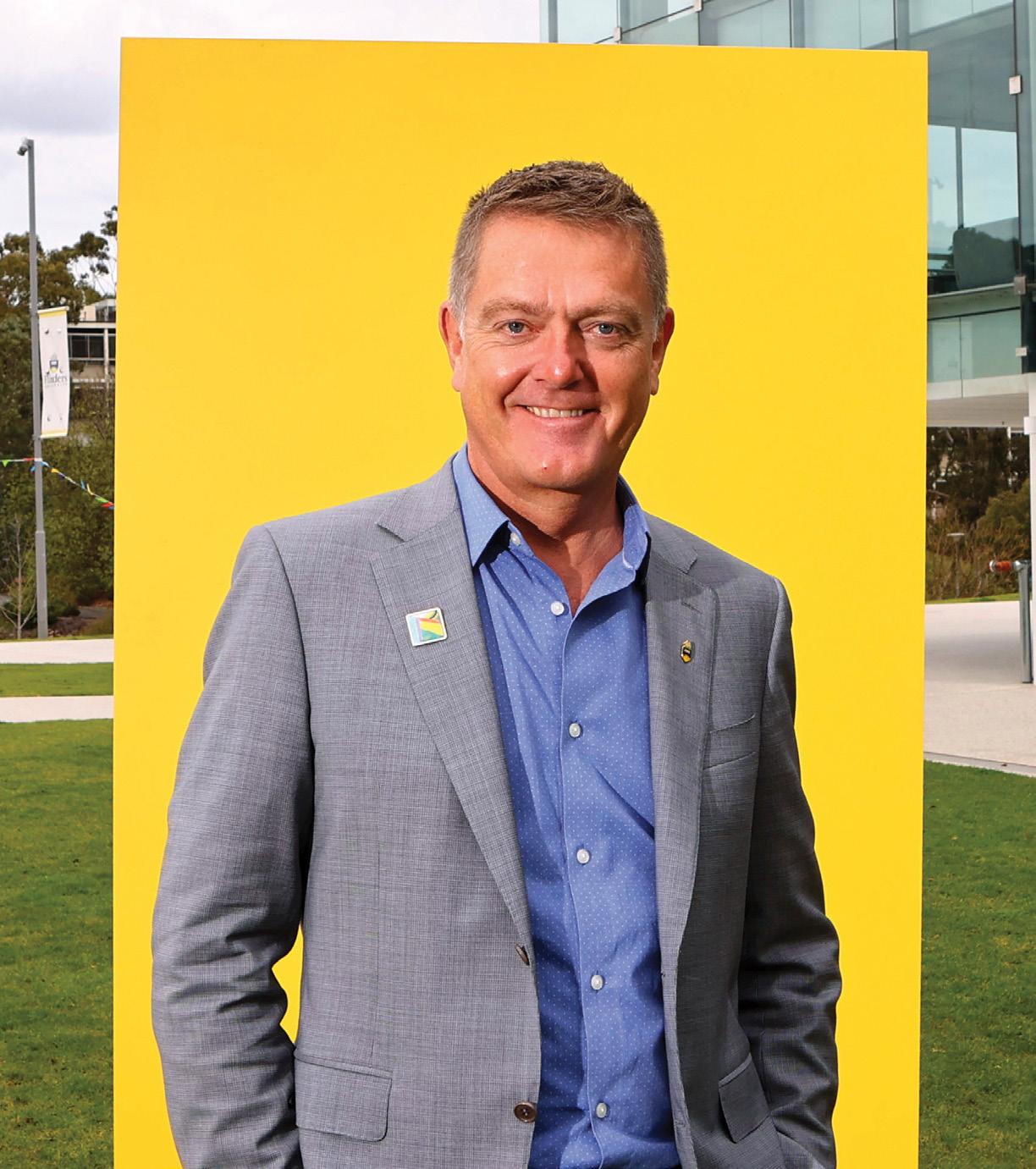
The Cygnet Award from SAGE is a testament to Flinders University’s commitment to reducing barriers, building a culture of respect and inclusion, and cultivating opportunities for First Nations staff members. It comes as a valuable addition to Flinders’ Bronze Award status under the Athena Swan framework, reaffirming the University’s dedication to gender equity.
The road ahead offers thrilling challenges, and to build on the success of our ambitious strategic plan Making a Difference: The 2025 Agenda, we are now planning a vision for Flinders’ future with early drafts of our Strategy 2035 document. It will enhance many positive developments already occurring – especially our commitment to sustainability, which has seen the University recognised externally by various different bodies for the great work we’ve been engaged in. For example, our conversion to 100% renewable energy on campus, the use of recycled water on our grounds, or the introduction of a landmark electric vehicle charging station featuring awardwinning bidirectional vehicle-to-grid technology.
Our great strength is our people, especially our immensely valuable alumni network – and with more than 5300 students graduating in the past year, we are thrilled that this vital community keeps growing. I offer my congratulations to all those who graduated from Flinders in the past year and welcome them to our alumni family. I encourage you to keep in touch, take full advantage of our alumni resources and make the most of your opportunities to truly make your mark on the world.

Professor Colin J. Stirling President and Vice-Chancellor
Scan the QR Code above to subscribe to our monthly e-newsletter
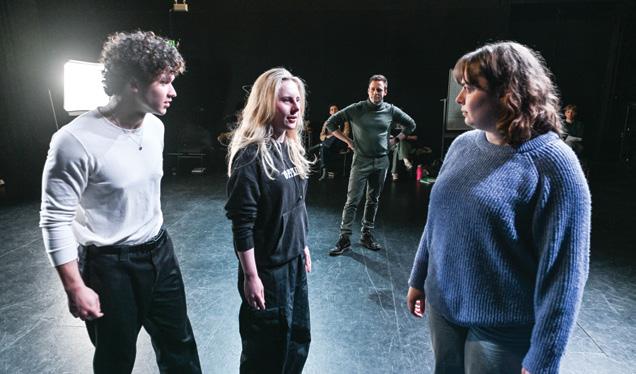
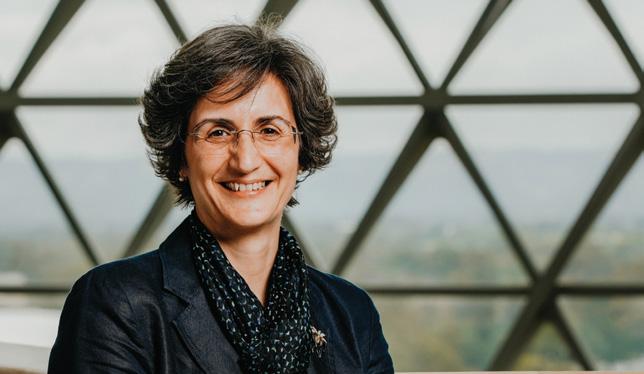
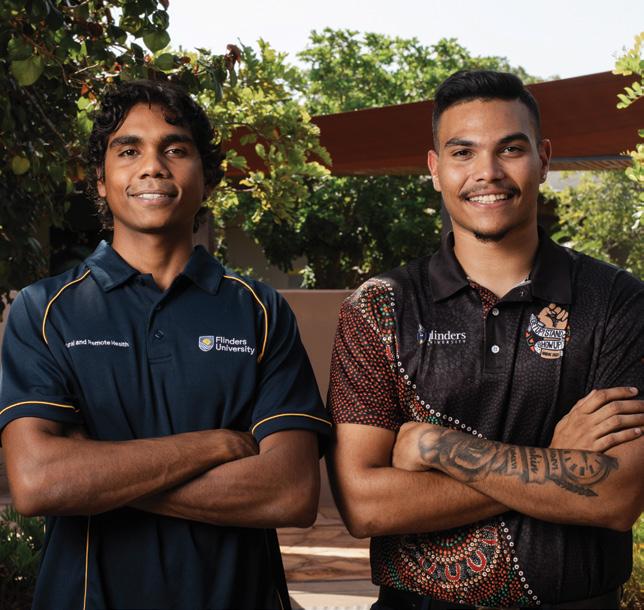
Editorial
Alumni & Advancement
Flinders University
alumni@flinders.edu.au
+61 8 8201 7969
Encounter
Editor: Leonard Rowe
Design: Esther Johnson
Photography
Production: Kim Pryor
Cover: Rachael Johinke
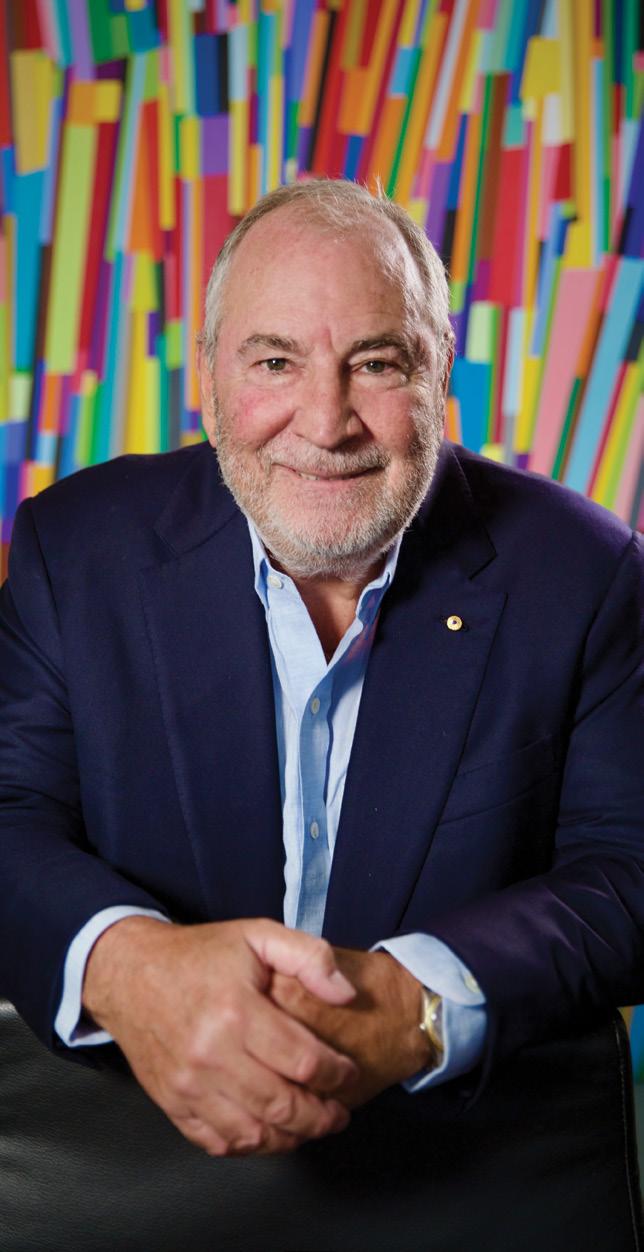
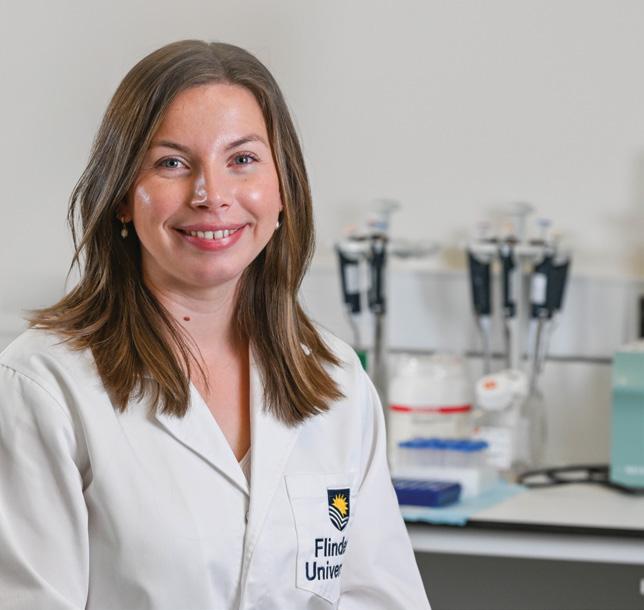
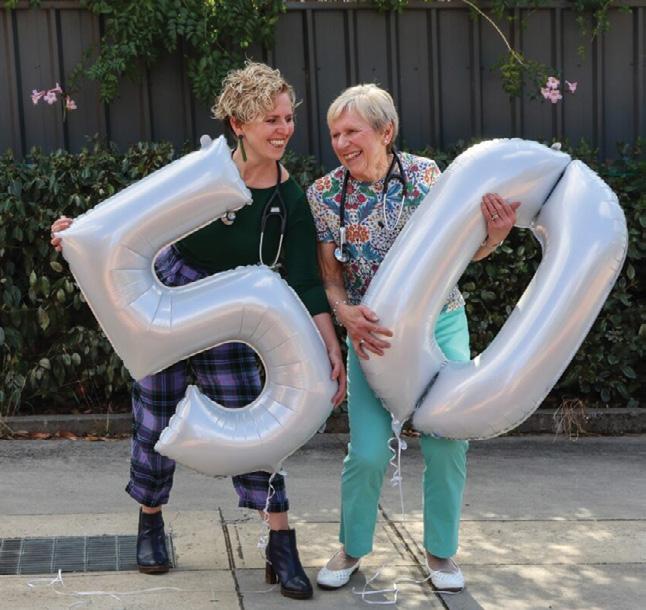
Disclaimer:
Copyright
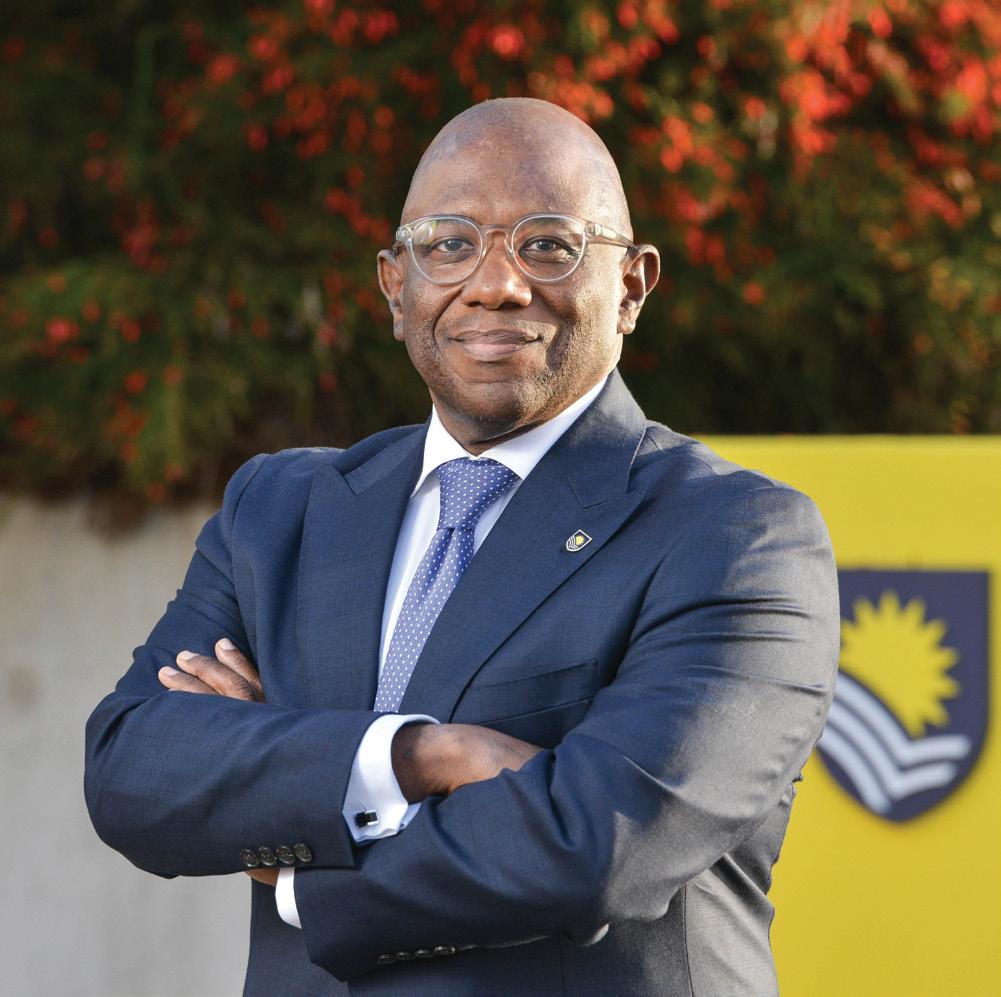
In the past 12 months as Director, Alumni and Advancement, I have been witness to so many incredible developments at Flinders University. Whether that’s the launch of new facilities like the City Campus and Health and Medical Research Building, or growth of research funding and grants, it is an honour to be part of something big, changing lives in the community for the better and offering a better opportunity for learning here and abroad.
I am deeply grateful for the warm reception I always receive from alumni at all the fantastic events we host. With more than 130,000 enterprising, innovative and curious thought leaders in more than 130 countries around the world, I’m never caught short for a conversation!
I’d like to thank all of our alumni who participated in our 2023 alumni survey last year. We learned that you want Flinders to increase the amount of networking opportunities for alumni, particularly at the Flinders City Campus. We also discovered that professional development is high on the list, including discounted short courses and lifelong learning seminars.
One of the highlights of this year has been our partnership with the Little Heroes Foundation in the fight against childhood dementia, a rare and devastating disease. This collaboration stands as a prime example of the critical role philanthropy plays in areas with limited funding from other sources. The support we provide is essential in advancing research and care for affected children, showcasing the profound impact we can make together.
You’ll find plenty of stories in the coming pages about alumni who have reconnected to provide mentorship, attend a networking event after many years out of touch or a current researcher who never left the institution after studying here!
50 Years of Medicine Gala Dinner Sat 19 October, Adelaide Oval
Join us at the 50 Years of Medicine Gala Dinner in October to acknowledge the achievements of our alumni and academics, past and present. Celebrate the University growing its Health and Medical study paths.
50 Years of the Drama Centre Fri 15 November, Flinders City Campus
Fifty years ago, Flinders University stepped into the spotlight and announced itself as a lead player in developing Drama as a dynamic creative force in South Australia. Join us to celebrate with past and present students, academics and industry professionals.
30 Years of Environmental Health Thu 21 November, Flinders City Campus
As we celebrate this incredible milestone, we reflect on the profound impact our graduates have made and continue to make in safeguarding our environment and promoting public health.
Fresh graduate and cover hero Rachael Johinke spoke to us about the realities of studying with a disability and how she hopes to help others push forward through adversity on page 12.
For those who can remember, our deep dive into the Slam the Exam protest on page 16, which occurred 50 years ago this year, is a gripping read on a poignant moment in not only Flinders’ history but the state of South Australia.
Pursuing university studies as a single mother living on Kangaroo Island has proved especially difficult for Enya Chitty, but she has prevailed and triumphed with help from the Weise Foundation Scholarship and the Jessie Cooper Scholarship for Women. The latter was created by the former Flinders Alumni Association to address the growing concern of retention rates of women in their final year of study, and to support students like Enya continue their studies. Read her inspiring story on page 24.
Happy reading and best wishes for the remainder of your year!

Ted Wynn Director, Alumni and Advancement
BY LEONARD ROWE
While playing for South Adelaide Football Club, Joel Cross (MBA ’23) decided he was ready to explore a new career path. Acting on a recommendation from club contacts to check out what major sponsor Flinders University could offer, he took the leap of faith into an MBA and has since applied his learned skills into a burgeoning career as a business leader.
“Juggling playing professional sport with work and study was pretty challenging, but Flinders was very flexible and I studied largely online, so that made it easier to squeeze in study when I had the time,” Joel says.
During this period, Joel was General Manager of Flagstaff Hill Golf Club and could clearly see how his new studies were directly applicable to both his employment and role as a leader on the footy field. Since graduating, Joel has become the General Manager of Community Cricket at the South Australian Cricket Association (SACA).
“There’s a lot of practical stuff undertaken in terms of leadership, which is the most important part of being in general manager positions these days, really leading people, which I found most relevant,” says Joel.
“We’ve got 30 staff and probably 50 or 60 casuals in the community cricket department at SACA, so it’s really important to make sure that they’re all getting what they need out of their career as well.
“If they’re engaged, they’re going to perform a lot better. There are a lot of different personality types in the modern workforce, so understanding what those types are, the need for diversity, the need for having different perspectives on life and work is really important for me as a leader at SACA.”
Of all the MBA subjects, it was one on sustainability that really got Joel thinking. Not something he had previously explored, it inspired him to become a founding member of the SACA Sustainability Committee and help develop new ways forward for the organisation.
“There’s a lot happening at SACA right now, and I’ve only been in the role for eight months, so I’m keen to learn more, but ultimately it’s just about getting people into playing cricket and giving them great experiences through the staff that we employ,” Joel says.
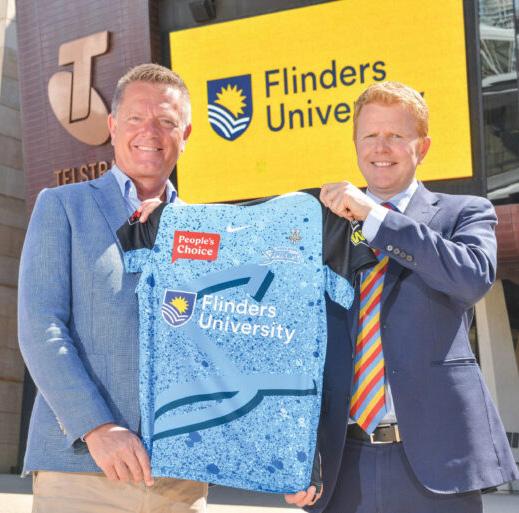
“I was an accountant by trade, but wanted to be involved with people more, so with my background in sport I knew I’d enjoy the role – people are what I’m most passionate about, giving them the best opportunities possible and getting kids involved with cricket and creating fun times for them, it’s a pretty cool remit!”
It’s clear to see the linear path between sporting programs SACA run at grassroots level, into state cricket and beyond for young South Australians. Similarly, Flinders is trying to help the next generation of sports industry professionals find their niche by offering work placement opportunities in all aspects of SACA’s day-to-day operations.
“When students come in, they get significant exposure to all the touchpoints of community cricket,” says Joel.
“It gives them a good taste of different career options to then pursue, whether that’s the marketing and commercial space or the high-performance space, it just gives them a realistic view of what working in the sporting industry can entail before they go out looking for a job.”
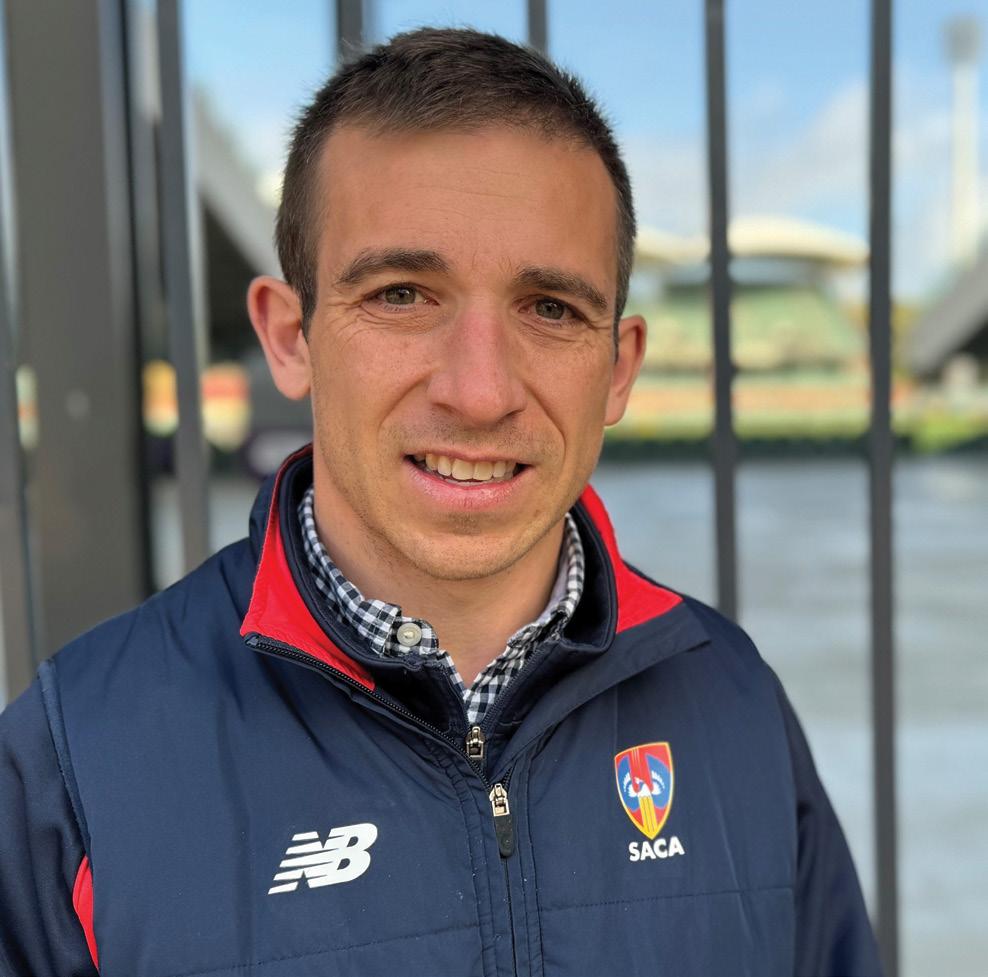
Joel Cross General Manager – Community Cricket, SACA
In 2023 Flinders University signed as the Official Education Partner of SACA, in addition to being the Principal Partner of the Adelaide Strikers Women’s Big Bash League team.
The partnership is centred on the co-design and co-delivery of curriculum programs, student placements with the Strikers and elite athlete research opportunities with SACA. Flinders’ logo will be proudly displayed on match screens, and on the front of the Adelaide Strikers women’s playing shirts for the 2024/25 season.
BY DAVID SLY
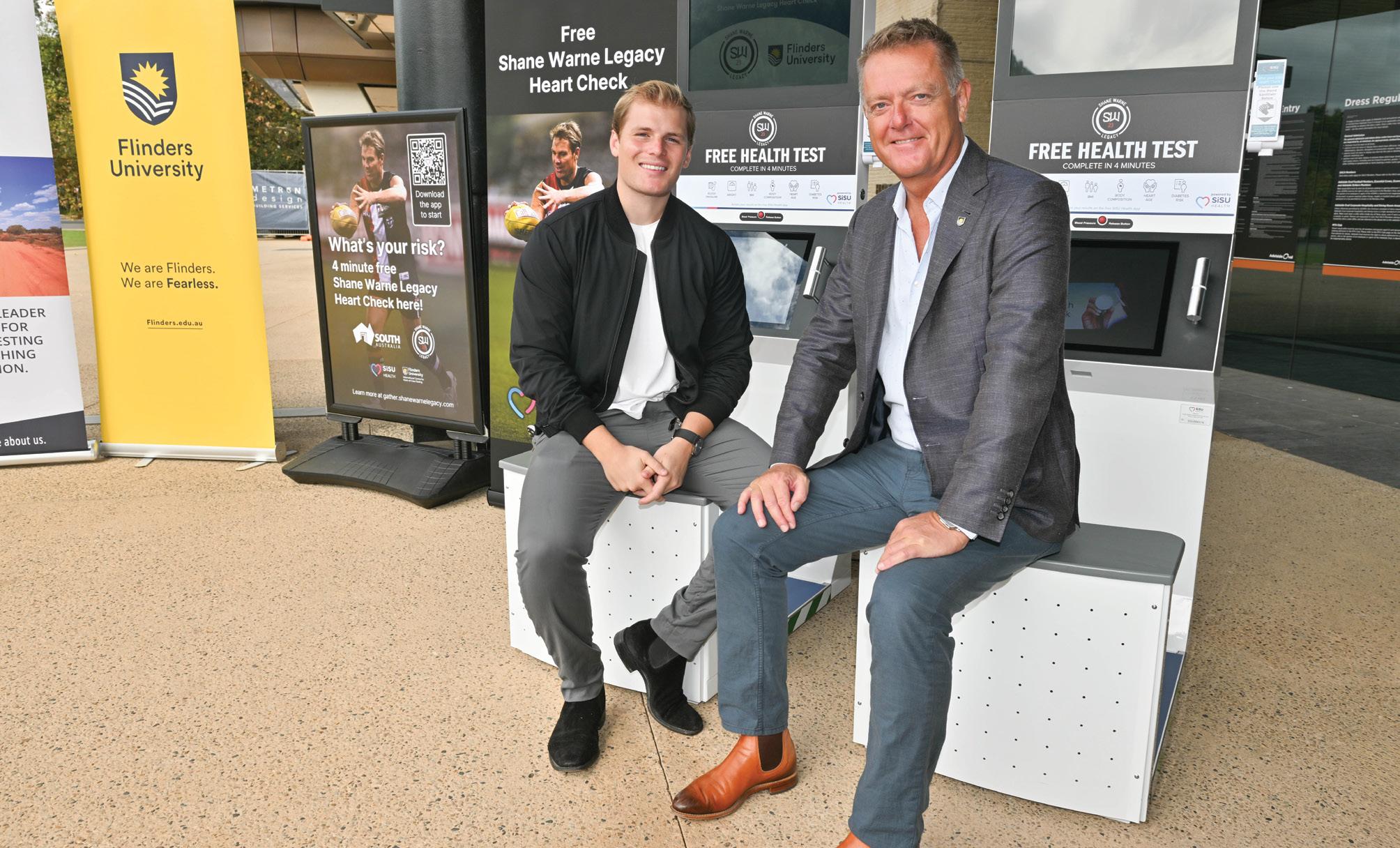
Jackson Warne and Vice-Chancellor Professor Colin Stirling at the AFL Gather Round check stations.
The South Australian Government joined forces with SiSU Health, The Shane Warne Legacy, and Flinders University to provide free heart and diabetes checks at the 2024 AFL Gather Round.
A total of 9,521 health checks were conducted across the four sites at Adelaide Oval, Elder Park, Norwood Oval and Mount Barker – including 7,375 Shane Warne Legacy heart checks, 1,073 blood sugar checks and 1,073 cholesterol checks.
Gather Round attendees were provided complimentary screenings for vital cardiovascular and metabolic health risk indicators, including blood pressure, heart rate, heart age, BMI, diabetes risk, blood sugar levels and cholesterol and triglycerides.
“With just one small finger prick, we can screen for heart health and diabetes, and deliver a result in less than 10 minutes,” says Vice-Chancellor Professor Colin Stirling.
“For more than 20 years, Flinders University has provided accurate, convenient, and patient-focussed point-of-care testing across extensive networks of more than 200 regional and remote locations across Australia.”
The Adelaide Oval doubleheader on Saturday 6 April drew massive crowds, setting a daily record for Shane Warne Legacy Heart Checks with an impressive 2,360 screenings conducted in a single day.
“What stands out is the overwhelming gratitude from the public,” says Jackson Warne, the late Shane Warne's son.
“Nearly every person I met over the week said thank you for making this available, they were truly grateful.”
The campaign has seen the highest customer satisfaction (Net Promoter Score +84) ever recorded by SiSU Health across any activation of its health stations, averaging 9.4/10 and demonstrating extraordinarily positive support by the participating public.
Male participation sits at 60 per cent of all checks undertaken, showing that the message resonates with this hard-to-reach cohort in the population where they account for 47 per cent of all GP visits in South Australia (2022/23).
Participants were also able to see their results from the health checks immediately on the SiSU Health mobile app which will now serve as a valuable tool to raise awareness about susceptibility to cardiovascular disease and Type 2 Diabetes encouraging earlier treatment and lifestyle changes.
For individuals with elevated blood pressure or a high BMI, the app will now provide prompts to consult with their GP.
If you missed out at Gather Round you can still get a Health Check. Scan the QR code above to find your nearest Health Station.
BY LEONARD ROWE
Cav. Maurice Crotti AO (BA ’71) graduated from Flinders University in 1971 and says, “Flinders University gave me the opportunity to have a second shot at tertiary education. With my Bachelor of Arts I was able to be accepted to do an MBA at Melbourne University.
“This education was an essential foundation for me to develop the skills I needed to not only become involved in our family business but also to play a role in the broader community.
“When I finished my tertiary education, I spent time in Italy and the United States working in the pasta industry and for an American advertising agency.
“Upon returning to South Australia, I was able to take part in developing strategies to place San Remo, over time, in a dominant position in our industry. San Remo now has manufacturing plants in Australia, South East Asia and Europe.”
Maurice was Managing Director and then Chief Executive Officer of the family-owned business, the San Remo Macaroni Company, from 1985 to 2015 and is now Joint Chairman and Joint CEO. The Group is one of the largest privately owned food companies in Australia.
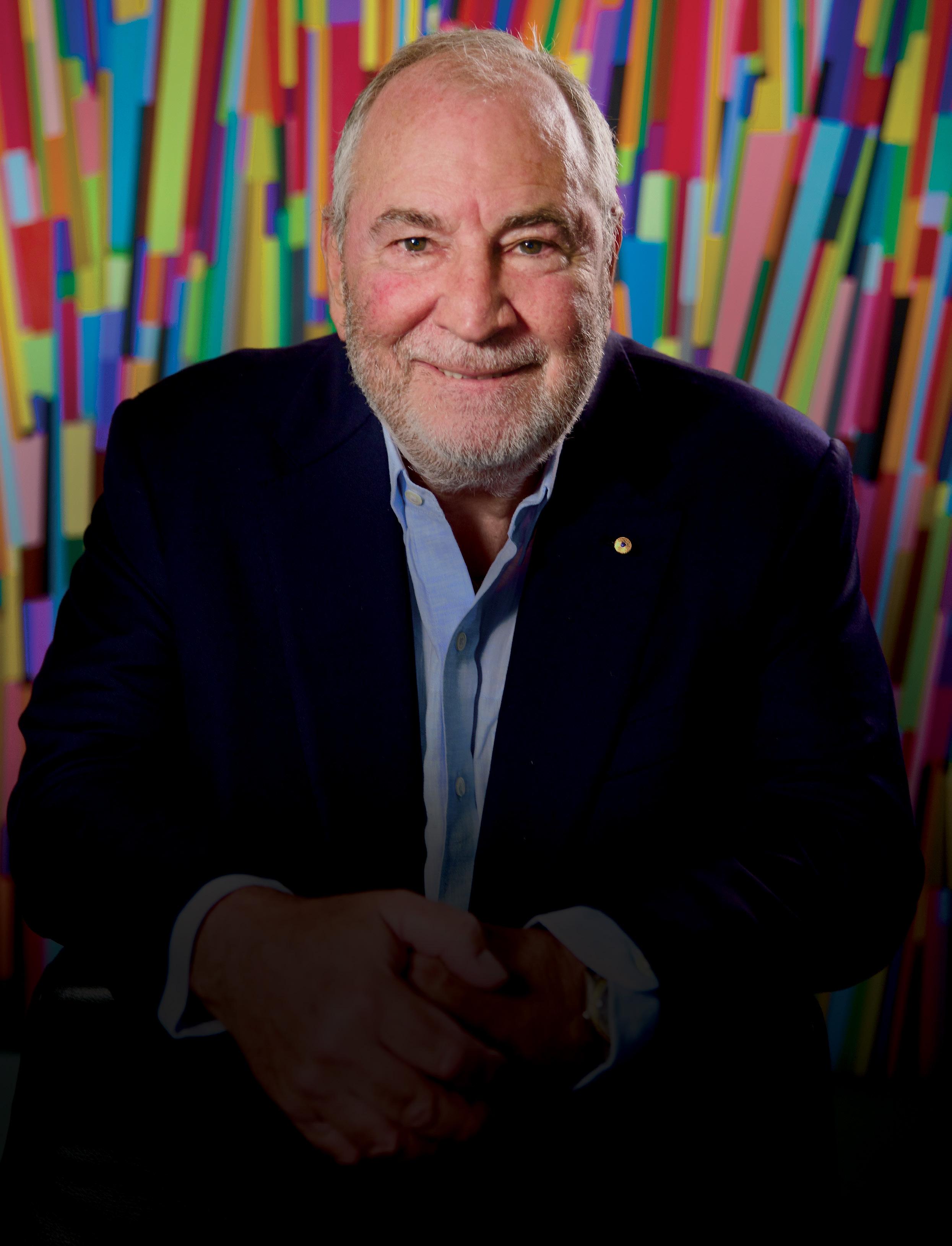
In 2015, he received the Distinguished Alumnus Award from the Melbourne Business School at the University of Melbourne, the highest honour the school can bestow on an alumnus for professional achievement and service to society.
In 2017, Maurice was knighted by the Italian Government with the Honour of Cavaliere (Cav.), for his achievements in the field of entrepreneurship, with particular reference to the promotion of Italy and Italian food.
In 2018, he was awarded the Officer of the Order of Australia (AO), for his service to the food manufacturing industry, food industry export initiatives, his involvement in State Economic Development Boards for South Australia and industry export and economic development programs for Australia.
He was a Board Member of the Australian Wheat Board and a director of Agri Chain Solutions Ltd a subsidiary of the Prime Minister’s Supermarket to Asia strategy. He initiated the formation of the South Australia Food & Beverage Exports Association which is now Food South Australia.
Maurice is currently a member of the Board of Governors of the Institute for International Trade (University of Adelaide).
An avid supporter of the arts for over 30 years, Maurice has been on several boards – the State Opera of SA, State Opera Ring Cycle Board and the State Theatre Company, as well as being a supporter of the National Gallery of Australia.
Cav. Maurice Crotti AO was awarded a 2023 Convocation Medal for his outstanding entrepreneurship and ambassadorship for food manufacturing, export and economic development in SA.
BY DAVID SLY
The drive to understand how Omega fatty acids affect developmental outcomes in babies propelled Professor Maria Makrides (BNutDiet(GradEntry) ’91, PhD(Med) ’95) to discover vast knowledge about maternal, pre-natal and infant nutrition that has greatly improved the health of both mothers and babies worldwide.
Executive Director at the South Australian Health and Medical Research Institute (SAHMRI), Professor Makrides is a global leader in translational nutrition research in the field of pregnancy and perinatal health for improved maternal-infant outcomes.
Her research program, assisted by a large, multidisciplinary team of more than 70 staff and students, assesses the role of nutritional strategies to prevent prematurity and its negative consequences for the tiniest infants, especially those born earlier than 29 weeks.
This bridges an important gap between research and clinical practice that has seen women and children directly benefit from her work, and has provided significant health, social and economic impact on the care of mothers and babies.
“My hope is to give children the best start in life by embedding evidencebased nutrition approaches to prevent babies being born too early and achieve better health outcomes.”
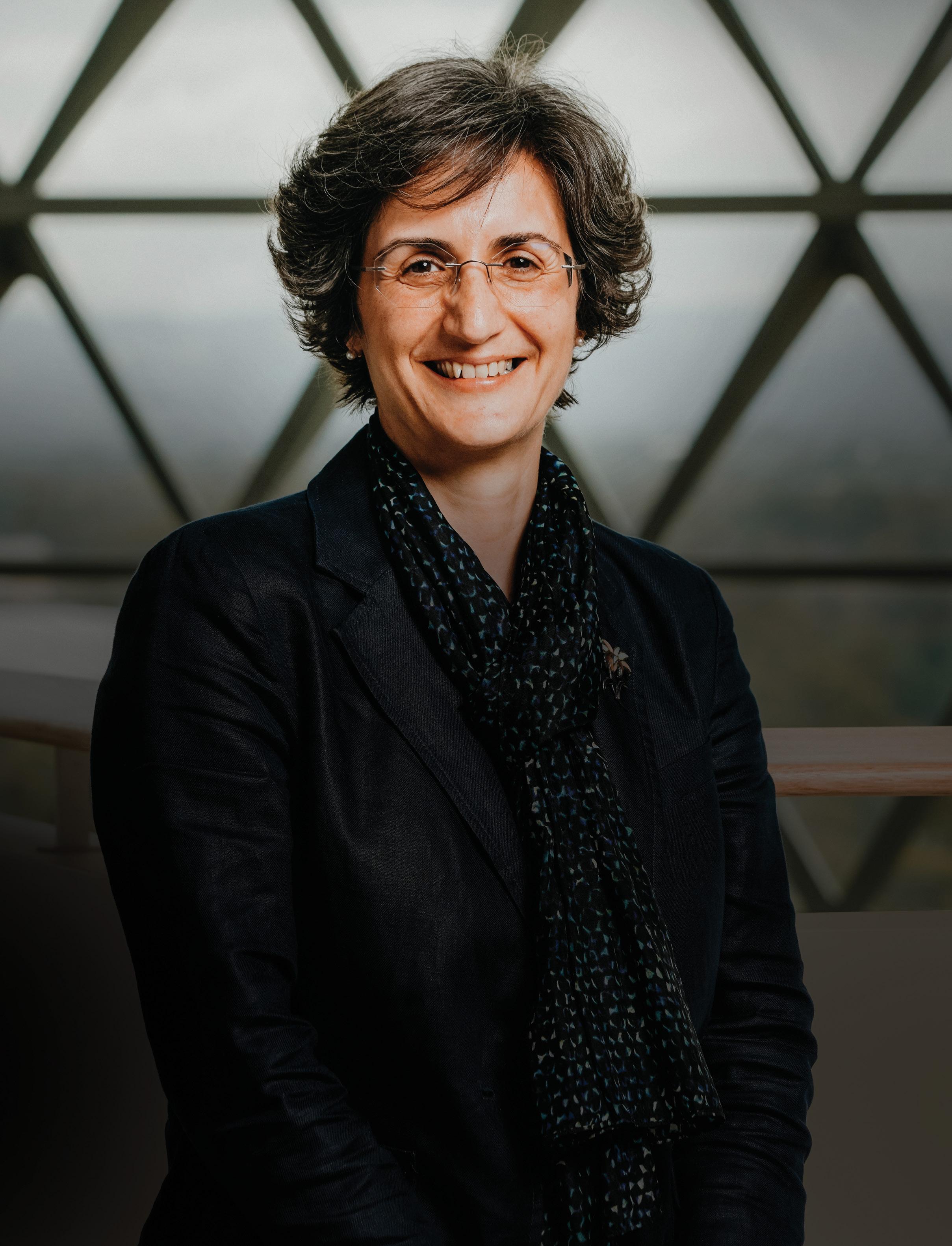
Recently, Professor Makrides has partnered with SA Pathology for the South Australian Maternal Serum Antenatal Screening program, which identifies women who are low in omega-3 and may benefit from supplementation to reduce risk of early birth.
Awarded SA Scientist of the Year in 2022 and elected a Fellow of the Australian Academy of Science and the Australian Academy of Health and Medical Science, Professor Makrides has also extended her influence to improve gender equality in medical and scientific professions.
She originally set up the South Australian Women in Science and Engineering Network, which has been superseded by the Athena Swan gender equity, diversity and inclusion accreditation program, with SAHMRI and all three SA universities joining. This has seen SAHMRI’s proportion of senior female researchers increase from 24% in 2015 to 42% in 2021. “I’ve done this to encourage support for the uplift of local talent, and to balance the retention of all our most promising researchers and scientists,” she says.
To help steer the next generation of medical and scientific experts, Professor Makrides continues to make a strong commitment to mentoring early- and mid-career researchers – particularly by helping women to manage work-life balance through applying flexible and innovative research mentoring strategies.
Professor Maria Makrides was awarded a 2023 Convocation Medal for her outstanding leadership in translational nutrition research in the fields of pregnancy and perinatal health aimed at improving maternal-infant outcomes.
Having a real-life, real-time client to work for is an unmatched learning experience, raising the stakes of achieving results and allowing students to become far more invested in the outcome.
This is now the case for College of Business, Government and Law students through the expansion of Flinders industry projects, mentoring and placement programs.
Classmates operate in teams as business consultants for South Australian businesses that have a problem to explore. During the semester, students take a deep dive into the business assigned to them – they’ll conduct research and develop strategic insights and recommendations for the client, presenting back to the business at the end of the period.
“It made me think about the transferability of my academic learning into a space where it was implemented. After 10 weeks of working on this, it was really cool to be up there finalising the presentation and delivering it,” says Cooper Lawson (BCrim ’22) who completed his project with the Department for Correctional Services.
Opportunities like these not only have a lasting impact on the student, but also the industry partner that has provided the experience. Graduates are better prepared and more confident to step into their career journey, which ultimately benefits our future workforce and community.
“It’s not just textbook learning. This is an opportunity in a real business with real people to be able to present something to us that will actually end up being sold in the marketplace, which is incredibly exciting.”
MIKE BROWN, MANAGING DIRECTOR & CHIEF WINEMAKER, GEMTREE WINES
There are many positives to be gained as an industry host – opening up a placement opportunity allows you to watch a student transform. Stepping into a professional environment for the first time can be challenging and through supportive mentorship, students can feel supported to push beyond their comfort zones, confront new situations, and adapt to dynamic work demands.
No matter what stage of your career, or the amount of time and resources you have, there is an opportunity to help provide the real-world experiences students need to become career ready. Industry Projects are offered to students throughout the year in a range of topics across management, marketing, entrepreneurship, advanced leadership, and international business.
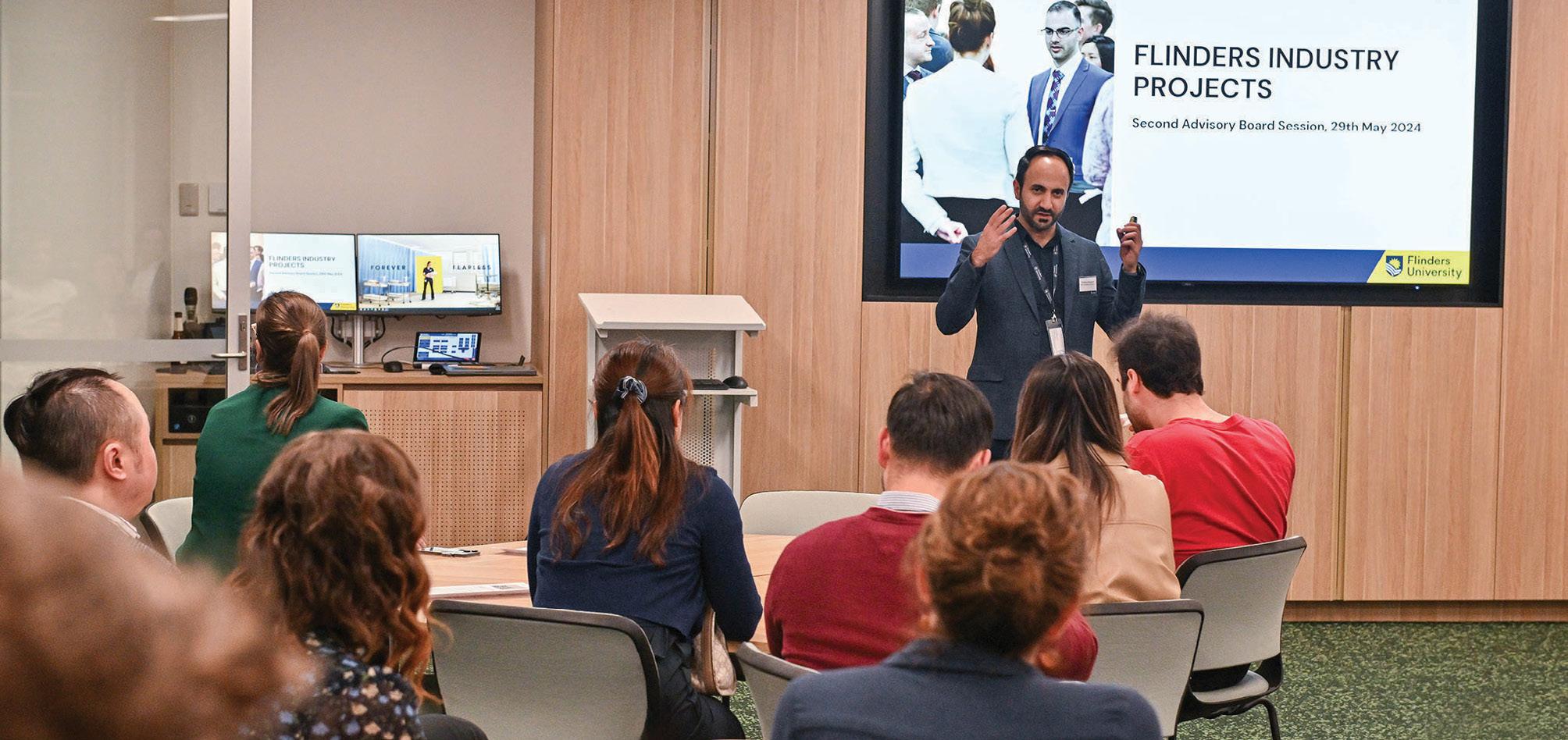
Flinders’ Work Integrated Learning (WIL) is more than work experience. WIL has been developed with an understanding that we must meet the needs of both our students and industry partners, to produce an integrated learning experience that benefits everyone.
For industry, this means hosting WIL students who can, and often do, add demonstrable value.
As an industry partner, organisations can benefit from a dedicated resource to complete a project or task that boosts the business’ capacity; enthusiastic new talent with fresh ideas and new ways of thinking, who have been studying that specific field and its needs from a different perspective; a potential recruitment pathway, or an opportunity to talent-pool; and engagement with the community and one of the world's leading universities.
Most industries can benefit from participating in work integrated learning. Some professional fields such as nursing, teaching and engineering have a long history of structured work integrated learning associated with professional accreditation requirements, but it is increasingly becoming a feature of higher education courses across all fields.
Flinders is dedicated to producing enterprising graduates who have the skills and knowledge to become lifelong contributors to society and can enter the workforce as career-ready professionals.
To do this, we need to ensure our students have practical, industry specific experiences that cover everything from communication and team work, to critical thinking and problem solving.
For more than 20 years, REDARC Electronics has fostered a strong relationship with Flinders, taking on WIL students, heavily investing in research and development, and employing graduates who have gone on to play an integral role in the growth of the company.
Anthony Kittel (DUniversity ’18), CEO and Managing Director of REDARC believes the partnership is much more than just an avenue to hire – the collaboration pushes both parties to constantly improve and lead the way to progress engineering in South Australia.
“We want our business to stay at the forefront of technology, so being able to employ undergraduates is critical,” he says.
Developing solutions to high-stakes problems means graduates really need to hit the ground running – something that REDARC employee of three years, Hayden Archibald (BEng(Robots)(Hons), MEng(Elect) ’21) believes was possible thanks to the practical learning approach to his Flinders degree.
“My 20-week industry placement, which I think is very unique, allowed me to get hands-on here at REDARC and that ultimately turned into employment.”
HAYDEN
ARCHIBALD, REDARC EMPLOYEE
“It’s quite noticeable to me which students have come from Flinders. They are able to get in there and get things done straight away – we’re using the exact same software here that I was at Uni.”
Similarly, Nusrat Gazi (MEng(Electronics) ’19) was amazed as an international student by the access to technology labs she was offered at Flinders and the opportunity to be creative and learn every day.
“I did my masters at Flinders, so had already used the software I needed for our work. It was transferable and familiar, which was excellent,” says Nusrat.
REDARC employees and Flinders graduates
Nusrat Gazi and Hayden Archibald
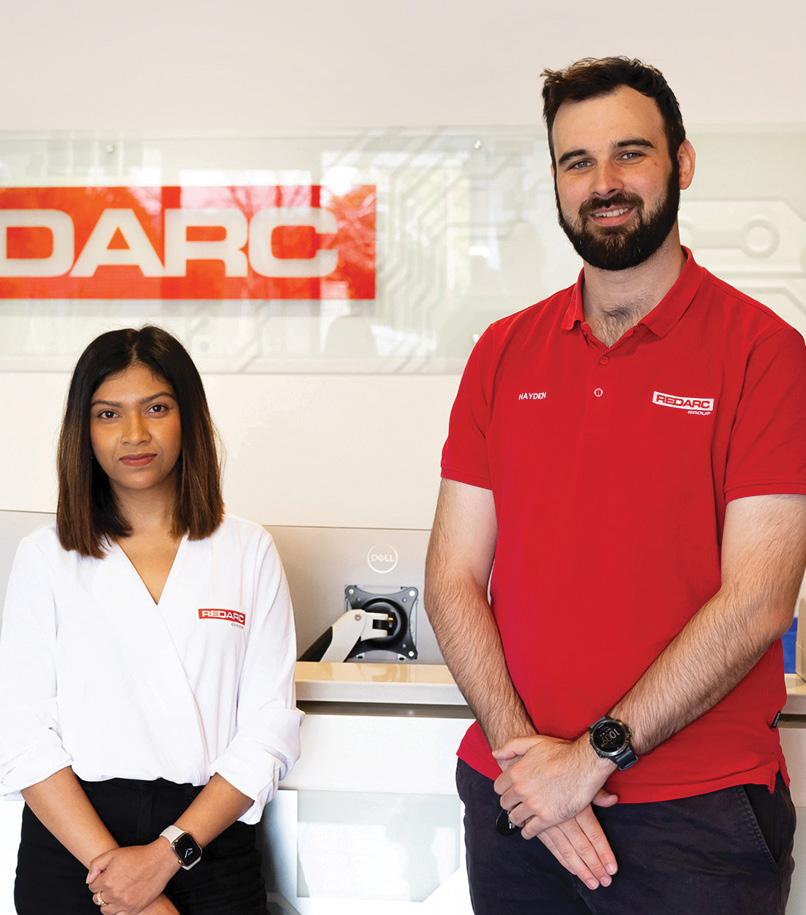
Learn more about Work Integrated Learning
BY DAVID SLY
Rachael Johinke (BDisDevelEd ’23) has never accepted that blindness limits her potential. It’s why she thrives as a young mother, as a star performer who came third on national television singing competition, The Voice, and has enabled her to complete a Bachelor of Disability and Developmental Education at Flinders University last year.
“I’ve always been determined, and I’m quite prepared to defy the odds. My parents have been incredibly supportive, but sometimes they thought I would take on too much or do things that were beyond my capabilities,” says Rachael. “It has always been in my nature to have a go.”
It was a huge undertaking for Rachael to persevere through her four-year degree, with many introduced obstacles beyond her vision impairment. This included preparing for her wedding, becoming pregnant – and the difficulties that came with commencing her studies just as COVID-19 lockdowns transformed all studies to an online environment.
“That was actually a benefit for me, because I was stuck at home and could devote myself entirely to studying,” she explains. “All of my performing commitments as a singer had stopped due to COVID disruptions, so I threw myself into my studies – and found it so rewarding.
“It became more complicated later as my life got busier, then I gave birth to Eli only two weeks after my final course presentation. So yes, the four years it took to complete my degree had its trials – but everything I did, I loved. When you are passionate about things, it’s easier to get them all done.”
Rachael came to her course almost by accident, after a friend introduced her to the Bachelor of Disability and Developmental Education and thought it would be an appropriate fit. “I’d previously been studying Speech Pathology in 2014, but I stopped because it wasn’t right for me. Still, I enjoy studying and I really wanted to get a degree by the time I turned 30.
“This course came as a surprise. Many people that I initially told about the course had never heard of Disability and Developmental Education, but I learned that this was a growing field and was going to be very worthwhile to the wider community.
“I got more excited as the course revealed itself to include so many things I’m interested in – disability, advocacy, anatomy, psychology. There was more than I expected incorporated in the degree.
“It also taught me so much about different perspectives on disability. I learned that many people suffer from great sadness
after they had acquired a disability through accident or trauma – and my experience is very different to that, because I’ve never let blindness stop me from doing anything.
“I had to learn and accept that not everyone’s experience with disability is the same, and that everyone’s goals are different.”
“This all became clear through my course work, but especially through my placements with different service providers. It opened my eyes to a range of journeys people go through with disability.”
Rachael is especially grateful to her teachers and people in the Disability Unit at Flinders, who helped her by converting a huge amount of study resources into accessible formats. “There were so many readings that were a fundamental part of the coursework and they scanned all the documents into Word files, which could then be read aloud to me by my computer. I didn’t have the technology to convert so many documents – and this had previously been a giant stumbling block when I tried studying Speech Pathology – but the help I received made it possible for me to keep working at finishing my degree.”
It resulted in Rachael winning the Prize for Academic Excellence award for her course, meaning she had the highest grade point average of her graduating class, which has prepared her for professional work. “There are lots of possibilities that can come from this line of work. You can work with adults, the elderly, children – and people with a vast array of disabilities. It’s a qualification that has a lot of flexibility.”
Rachael has joined Crystel Care, a small company of occupational therapists, positive behaviour specialists and developmental education graduates who provide complex behavioural and life goals support to a range of clients. She is also determined to maintain a solid work/life balance – which includes her recent return to singing and performing gigs in Adelaide venues.
“I’m ready to start taking on clients in my professional role, but I’m in no rush. Eli is still so very young, and caring for him is my number one priority – but I’m looking forward to using the tools and techniques I’ve learned, so that I can help others in the same way that I want to be treated. Because I have a disability, this is a great passion of mine. What I know is that I’ve got a real opportunity to improve the quality of life for a lot of people with disabilities.”
“I’ve always been determined, and I’m quite prepared to defy the odds. It has always been in my nature to have a go.”
RACHAEL JOHINKE
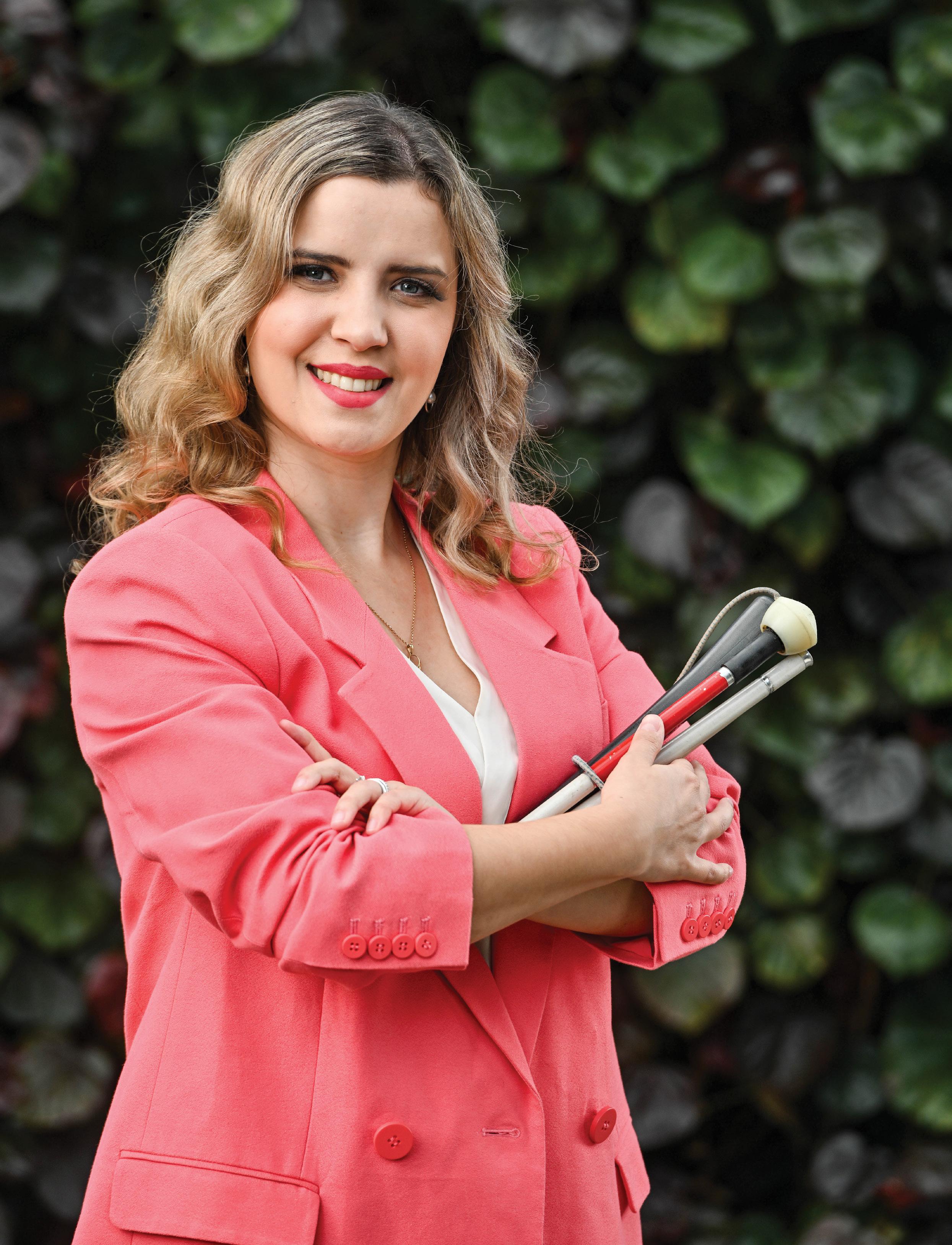
by
When Flinders University developed its first public health courses 40 years ago, the primary focus was controlling infectious diseases, reducing maternal and child mortality, motor vehicle safety, and starting to tackle the rise of chronic diseases.
Over the past four decades there have been significant changes in public health, driven by advancements in science, technology, policy and our understanding of community health. Global disease surveillance, big data and analytics, vaccine development, digital health, equity, and environmental health are now important areas of focus.
“We have eight diverse teams within Public Health including an expert health economics team, an International Point-ofCare Testing team doing frontline work in remote communities, the National Centre for Education and Training on Addiction, and many First Nations researchers. It’s exciting that through studying Public Health at Flinders, you can also undertake a placement, and may even get a job at the University in one of the teams,” says Professor Jacqueline Bowden, Interim Discipline Group Lead of Public Health.
Scan the QR code to watch Professor Nicola Spurrier, Chief Public Health Officer for SA Health, talk about why Public Health graduates are in demand.
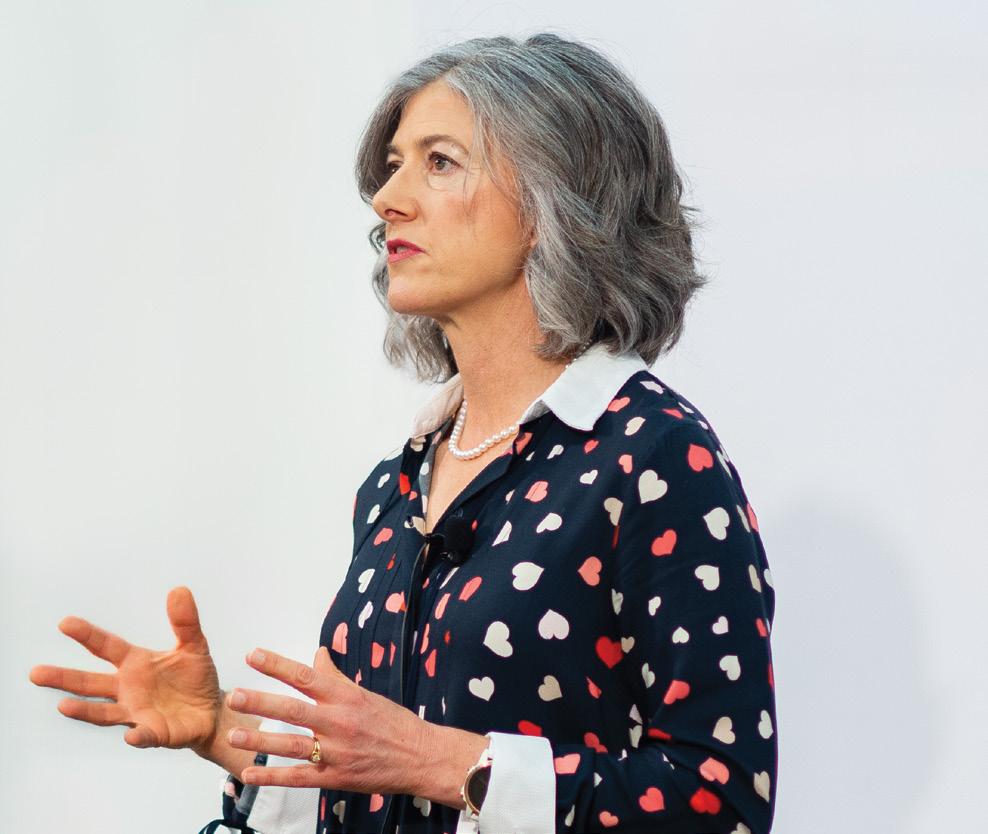
In 2024, Flinders is also celebrating 30 years of teaching Environmental Health. Almost 600 exceptional graduates have embarked on remarkable journeys, safeguarding our environment and promoting public health.
Scan the QR code to learn more about our 30-year celebrations.
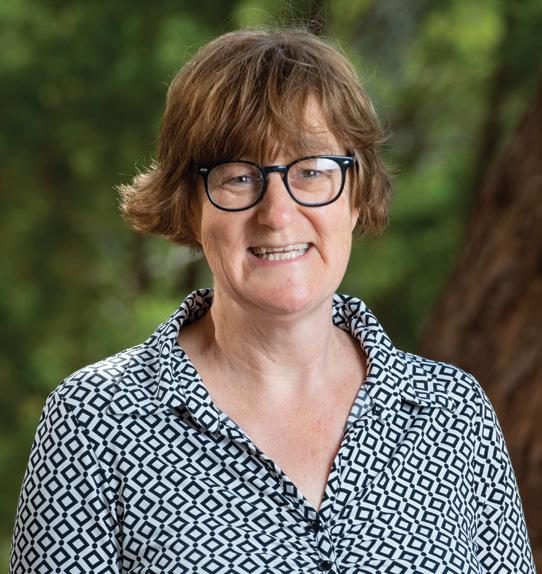
“When I see graduates that I have
taught running things and making big
decisions
and generally being awesome
I
feel
like I might have played a ‘maybe small’ role in that, which makes me very proud. I also love the combination of teaching and research – it is never dull.”
PROFESSOR KIRSTIN ROSS (GradDipEnvHlthPrac
’09)
Course coordinator of the Graduate Diploma in Environmental Health Practice and the Master of Environmental Health
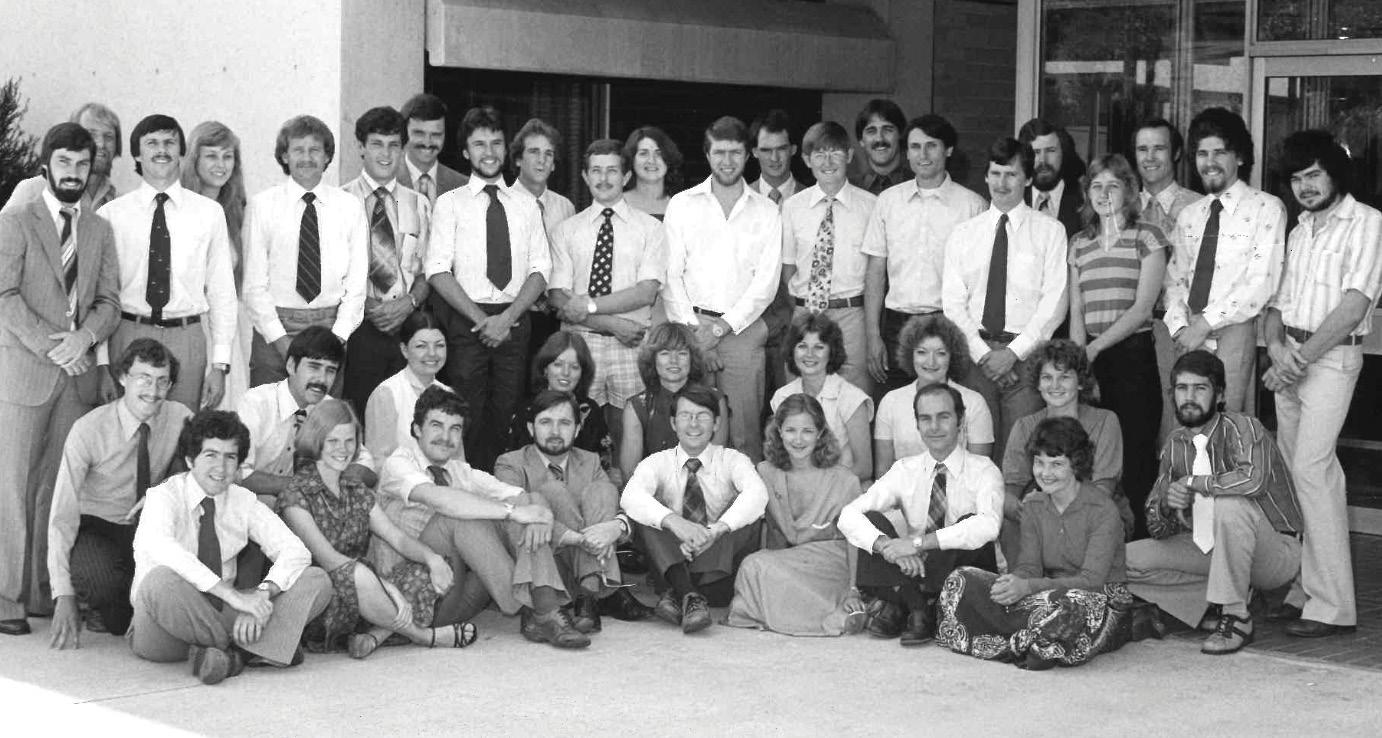
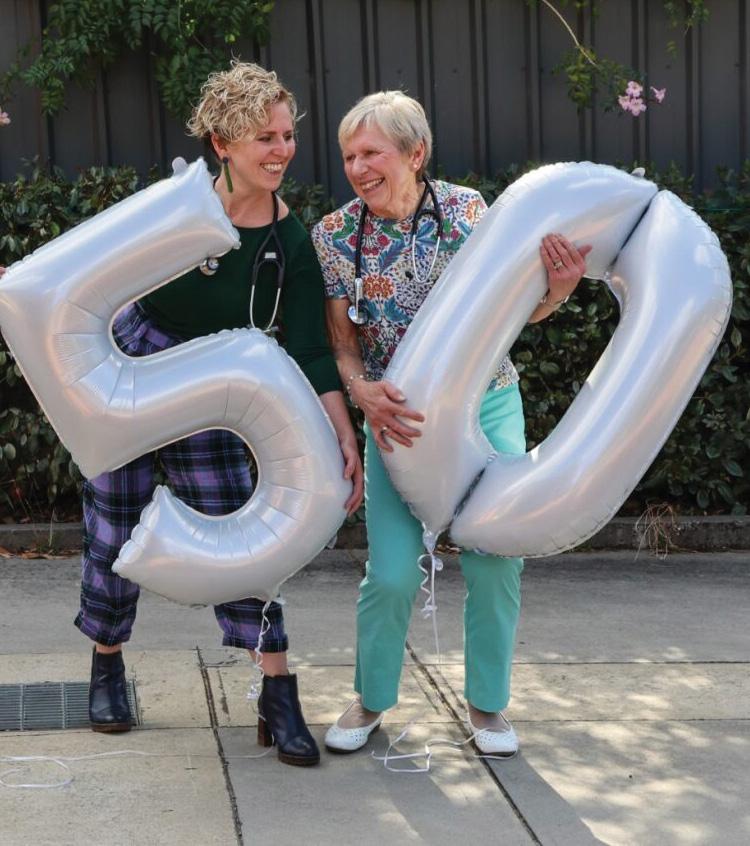
From 1974 to 2024 and beyond, Medicine at Flinders University is about making improvements to the health of the communities we serve.
Since its establishment, Flinders’ medical program has grown from an initial intake of 64 students in 1974 to become one of the most diverse medical programs in Australia, home to more than 700 students.
This year also marks the historic collaboration between the University and Flinders Medical Centre (FMC). FMC was the nation’s first purpose-built academic medical centre that integrated with a medical school.
Over the past 50 years, Flinders’ medical program has gained international recognition for its teaching, research and clinical practice, says Professor Jonathan Craig, Vice President and Executive Dean, College of Medicine and Public Health.
“We were the first university in Australia to integrate a medical school and hospital and leverage the symbiotic relationship between the two,” says Professor Craig.
“This relationship, based on co-location and inter-connectedness of research, education and clinical care, has now been replicated across all our sites in South Australia and the Northern Territory, and includes partnerships with many local health networks, hospitals and primary care practices.”
Vice-Chancellor Professor Colin Stirling says the University is proud to be a world class destination for health and medical education and research.
“I’m extremely proud of the medical program’s 50-year milestone. Flinders has made outstanding contributions to improving the health of communities in local, regional and remote areas of South Australia, the Northern Territory and beyond,” he says.
Learn more about our 50 year celebrations
“We will continue to build on our outstanding record as a pioneer in integrated health education and research, focusing on real-world improvements in health and wellbeing for all Australians – no matter where they live.”
The University’s medical program has been at the forefront of innovation in medical education since its inauguration. In 1996 it became the first in Australia to offer a four-year graduateentry medical program as an alternative to the traditional undergraduate courses.
In 2011, it was the first in Australia to offer a full medical program in a rural and remote setting, in the Northern Territory, and remains the only local medical program in the NT. In 2025, the Rural SA Medical School will commence, with around 40 students enrolled.
“One of our great strengths is having a considerable presence in rural and remote communities throughout South Australia and the NT,” says Professor Craig.
“Our geographic footprint – covering a network of campuses across regional South Australia and through central Australia to Darwin – is a defining feature of our medical program allowing us to deliver regional academic programs and research supporting some of the most under-served communities in Australia.
“A major aim of the Northern Territory Medical Program is to train people from the Territory, in the Territory, and to stay and work in the Territory. We also recognise that training more Aboriginal and Torres Strait Islander people to become doctors is a critical part of the Closing the Gap initiative.”
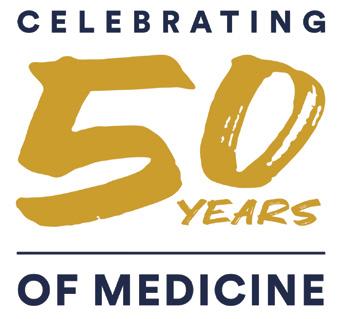
BY DAVID SLY
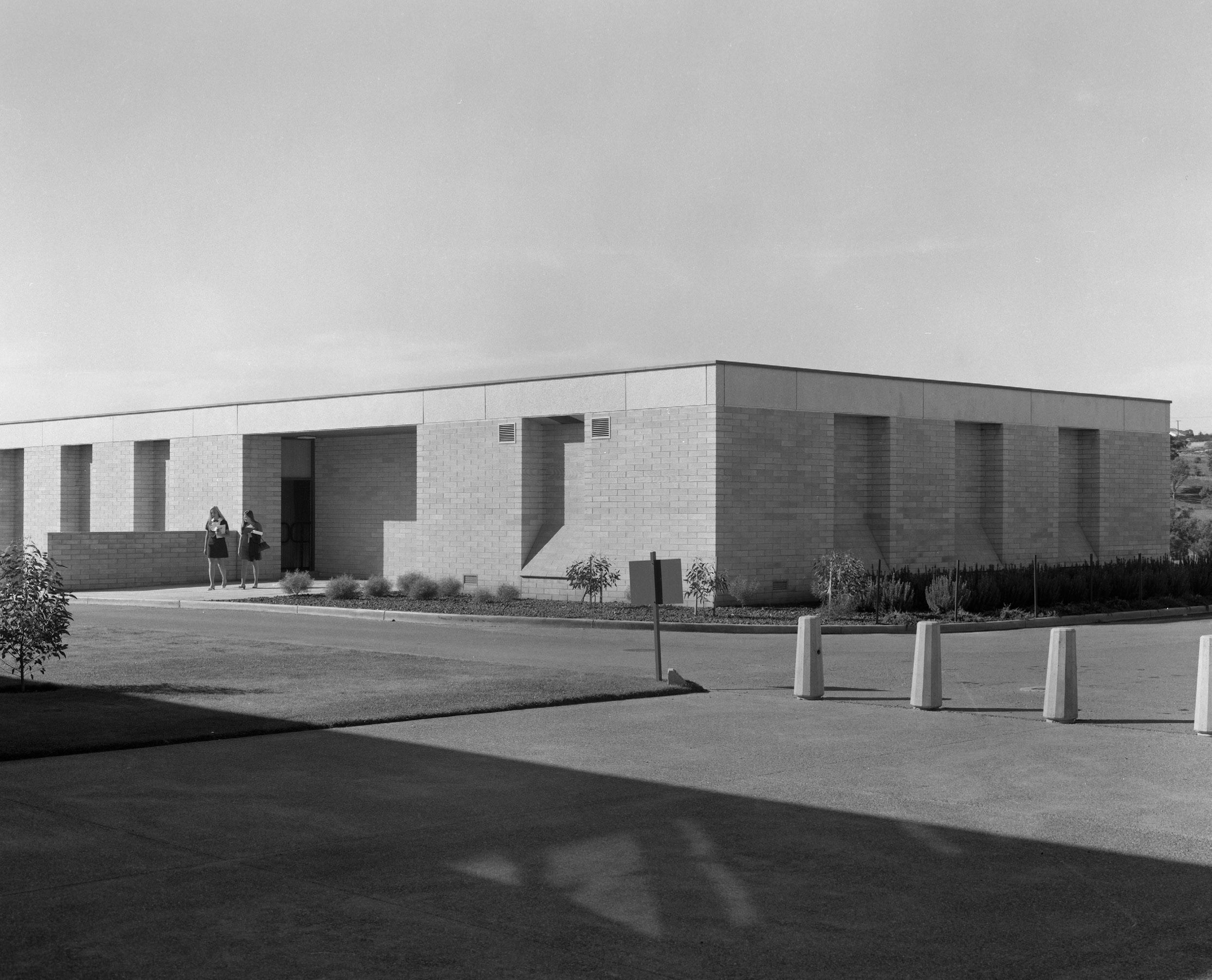
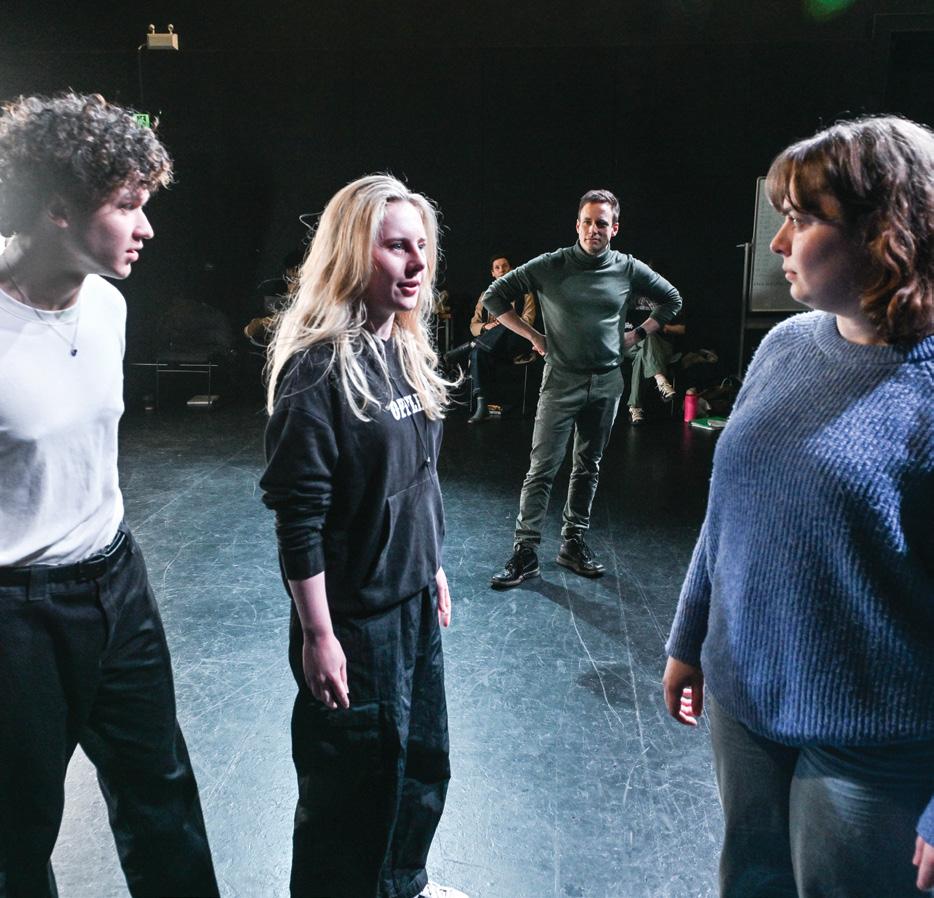
Fifty years ago, Flinders University stepped into the spotlight and announced itself as a lead player in developing Drama as a dynamic creative force In South Australia.
Flinders has taught Drama as a separate discipline since the School of Humanities was established in 1967, but within five years took the crucial step of introducing a professional actor training program at Flinders Drama Centre, with the first graduates emerging in 1974.
This was the first professional acting training program in Adelaide, and Flinders became the first university in Australia to offer actor training. It subsequently provided the springboard for a host of celebrated actors, such as the multiple AFI and Logie Award winning actor Noni Hazlehurst AM (BA ’75,DLitt ’07), Hollywood star Xavier Samuel (BCreatArts(Hons) '06), and Helpmann Award winning actors Cameron Goodall (BA(Hons) ’01) and Amber McMahon(BA(Hons) ’02), directors such as the Helpmann Award-winning Gale Edwards AM (BA ’75, DLitt ’15), and Benedict Andrews (BA ’95, DLitt ’16), and Oscar-nominated film-maker Scott Hicks (BA(Hons) ’75, DLitt ’97) and playwrights
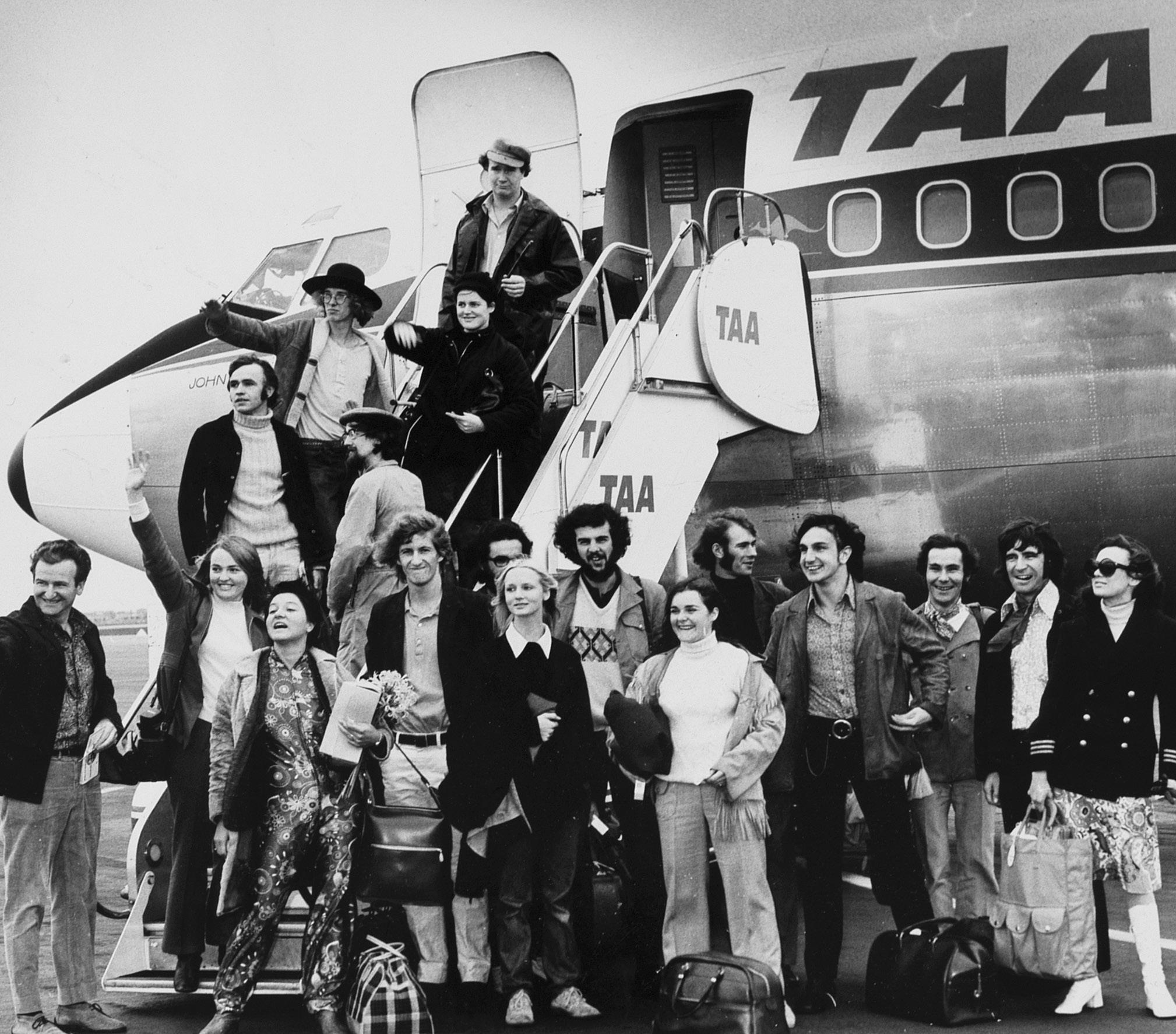
such as the AWGIE winners Melissa Reeves (BA(Hons) ’84) and Caleb Lewis (BA(Hons) ’02) just to name a few.
Even more importantly, Flinders graduates and staff have driven the emergence of several important Adelaide theatre companies, including Red Shed Theatre, Brink Productions, Flying Penguin Productions, The Border Project and more recently CRAM Collective.
Drama at Flinders was built on key principles of innovation and bold presentation decisions – which was clear to see with the productions from the foundation chair of Drama, Professor Wal Cherry. The innovative former Melbourne theatre director presented the musical The Fantasticks at the newly-opened Space Theatre in November 1974, with a cast that included future star actors Noni Hazlehurst, Neil Melville (BA(Hons) ’77), Tom Considine (BA ’76) – alongside Douglas Gautier, who is now CEO and Artistic Director of the Adelaide Festival Centre.
Capturing the spirit of innovation and embracing bold new Australian works has set the Flinders Drama course apart
from traditional acting conservatoire institutions, which were conceived more as an actor’s training college in service of the industry in its current form. The Flinders Drama vision has been more focused on nurturing the creative minds who will lead the industry into the future.
This maxim has been maintained throughout its 50 years, according to Dr Christopher Hurrell (BA(Hons) ’01), Lecturer in Drama, Course Coordinator for the Bachelor of Performance and current manager of Flinders Drama Centre, who recalls an inspiring spirit of creativity and innovation when he trained at Flinders as an actor and director in the 1990s.
“Excellence in Drama is not just about doing the work, but learning how to make the work. I know the benefit of that, because it led to my career in theatre that has given me national and international opportunities,” says Dr Hurrell. “Flinders’ unique research-and-practice approach, pioneered by Professor Cherry in the 1960s and 1970s, and Professor Emerita Julie Holledge in the 1980s, 1990s and early 2000s, has been revived and secured for the next generation of South Australian emerging artists.”
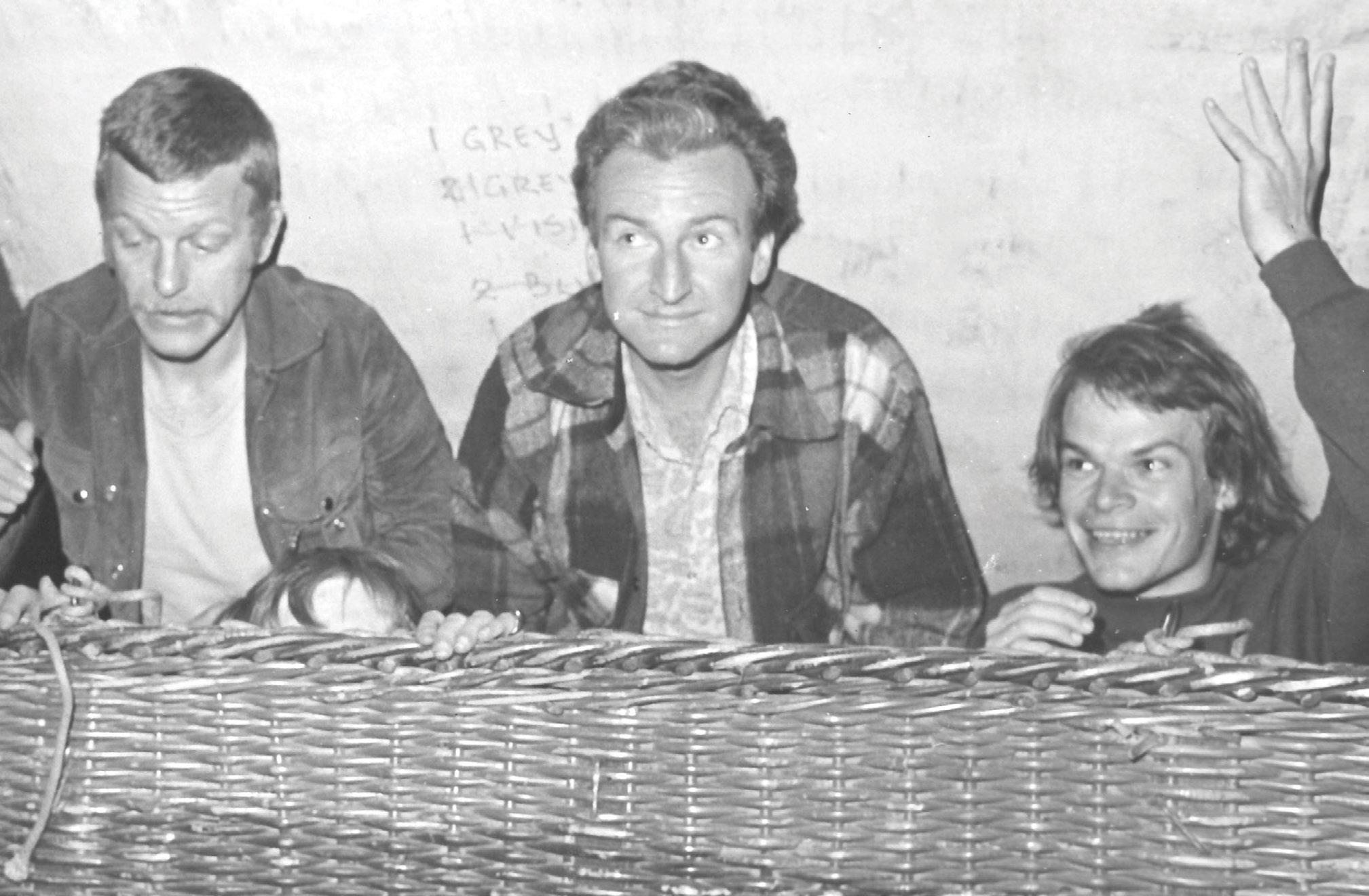
This commitment was renewed with enthusiasm when Flinders undertook a review of Drama in 2020, ultimately resulting in the new Bachelor of Performance degrees launched this year, which respond to the changing needs of the sector in light of emerging trends, technologies and platforms.
“This is crucial,” says Dr Hurrell. “There has to be innovation for progress, and for this to occur at Flinders will ensure the dynamic future of Drama in this country.”
The tradition of innovation, and the fearlessness to step outside of convention, continues with Flinders Drama’s choice of celebration for its 50th anniversary – making this year’s Wal
Cherry Lecture, in the Space Theatre on Friday 15 November, a screening of a rare documentary movie, The Hall of Mirrors: A Festival, being a behind-the-scenes expose of the 1982 Adelaide Festival. The event will also feature a discussion between Scott Hicks, who was commissioned to make the film, and 1982 Adelaide Festival Artistic Director Jim Sharman (also notorious as director of The Rocky Horror Picture Show).
“It appropriately focuses on a moment when the new and the exciting happened in Adelaide,” says Dr Hurrell, “and that moment inspires us all to keep being innovative, now and far into the future.”
The Wal Cherry Lecture
The Hall of Mirrors: A Retrospective
8pm Fri 15 November, Space Theatre
A film screening and conversation with Jim Sharman and Scott Hicks.
50 Years of Drama Centre
6pm Fri 15 November City Campus, Floor 14 Event Space Alumni Reception and Celebration
The Resistible Rise of Arturo Ui by Bertolt Brecht 13–16 November Matthew Flinders Theatre, Bedford Park Campus
Presented by Drama Centre Third Year actors. Directed by Dr Christopher Hurrell.
We want to invite all our Drama alumni to join this year’s celebrations! But we’ve lost contact with many over the years. Check out our list of missing drama graduates via the QR code to see if you can help us get back in touch!
The graphic art of protest, propaganda and politics took hold in Australia in the 1970s. Characterised by bold imagery, provocative slogans and vivid symbolism, this ‘alternative’ form of printmaking played a crucial role in protests, rallies and grassroots activism, amplifying the concerns of the nation’s counterculture.
If you don’t fight...you lose revisited this era, featuring the prints and posters of the Progressive Art Movement (PAM), a small, dedicated and hard-hitting multi-arts organisation active in Tarntanya/Adelaide 1974–78.
PAM formed as an offshoot of the Art and Politics course taught at Flinders University by Brian Medlin, the radical professor of Philosophy who had been arrested at a Vietnam Moratorium march, and Ann Newmarch, a high-profile feminist artist and Art School lecturer. The group united artists, writers, poets, filmmakers, actors and musicians with the aim of forging a politically progressive culture rooted in local conditions and opposing US imperialism.
Reimagining the role and purpose of their work, PAM artists including Ann Newmarch, Mandy Martin, Robert Boynes, Andrew Hill, Pamela Harris, Peter Mumford, Christine McCarthy, Robin Best and Jim Cane joined the ranks of political protestors. They lived their activism by demonstrating about art, working as artists on the factory floor, creating posters for political causes and, on occasion, working as a collective in the Progressive Printers Alliance.
Works in the exhibition were primarily drawn from the Flinders University Museum of Art (FUMA) collections. The overarching title references a Redgum song and pays homage to PAM’s only exhibition held in 1977. From the vantage point of 2024, we reflect on the power of these works to challenge the status quo, mobilise communities and disseminate messages of resistance and solidarity. Moreover, we recognise the enduring relevance of their themes and issues as we navigate gender, climate and social justice challenges amidst shifting power dynamics and a rapidly changing world order in the 21st century.
If you don't fight … you lose: politics, posters and PAM was curated by art historians Catherine Speck and Jude Adams. Supported by Arts South Australia, the Historical Society of South Australia, the History Trust of South Australia, the Gordon Darling Foundation and the Vera Moore Foundation, the exhibition was presented by FUMA from May 6 to July 5, 2024. A full-colour catalogue (104 pages) published by Wakefield Press is available for purchase from FUMA, please contact: museum@flinders.edu.au
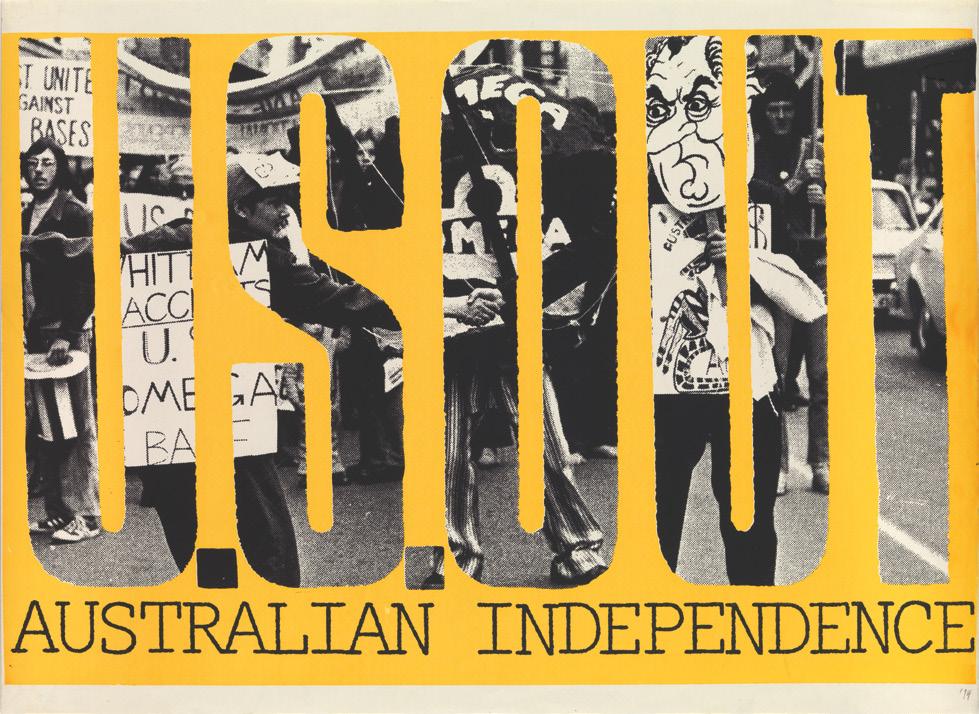
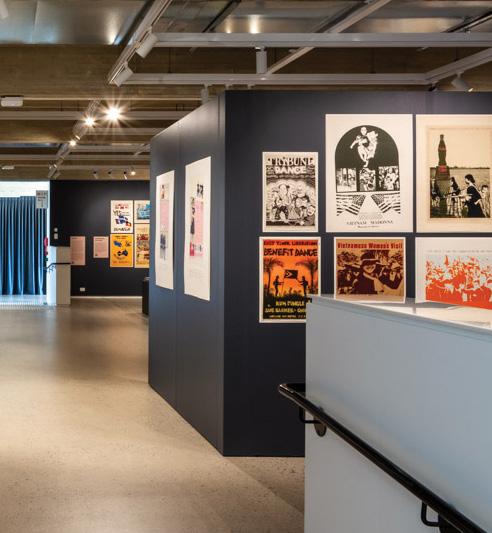
Improving the health of both mothers and babies worldwide and outstanding leadership in supporting people with a disability are amongst the achievements of the remarkable individuals recognised in the 2023 Flinders University Alumni Awards.
Twelve outstanding alumni were awarded by Flinders University Chancellor John Hood and Deputy Chancellor and Chair of the Alumni Awards Selection Committee, Elizabeth Perry AM, at a gala dinner held at Adelaide Town Hall celebrating the awardees.
In front of an audience of family, friends, former mentors and past awardees, the Flinders University graduates were formally recognised and celebrated for their extraordinary contributions to their fields and society as a whole.
The Convocation Medal, the highest of the University’s alumni honours, was awarded to Cav. Maurice Crotti AO and Professor Maria Makrides, for their substantial and outstanding contributions to their respective fields on a local, national and international level.
DISTINGUISHED ALUMNI AWARD
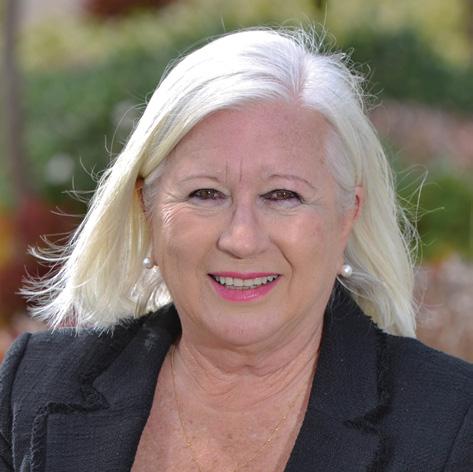
Professor Robyn Clark DipAppSc(Nurs) ’86
BNg(PostReg) ’94
Awarded for her distinguished contribution to research that is improving access to evidence-based cardiovascular care for underserviced and disadvantaged populations.
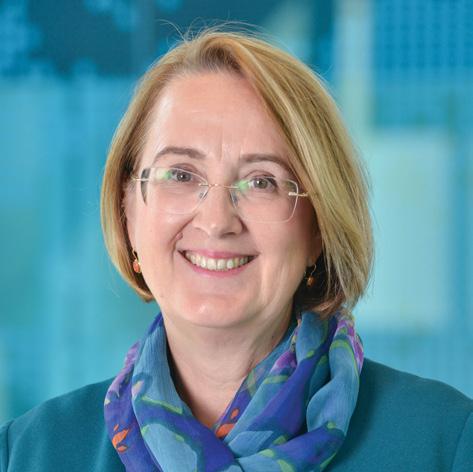
Professor Bogda Koczwara AM BM, BS ’90
Awarded for her distinguished leadership in the medical oncology profession and health services research.
“It’s easy to reap the benefits when you’re more senior, but it’s how you treat those who are the least powerful in society that defines you.”
PROFESSOR BOGDA KOCZWARA AM
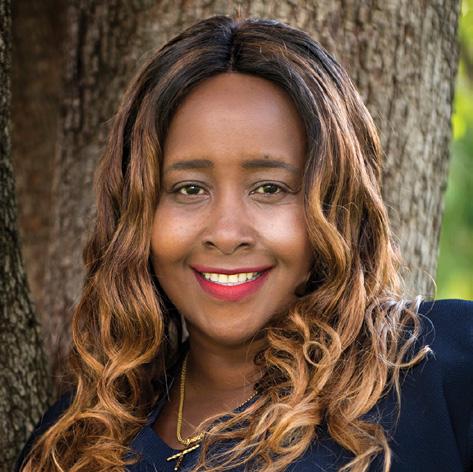
Emily Korir GradCertDisSt ’16
Awarded for her distinguished leadership and advocacy, through lived experience, in supporting people with a disability and in recognition of volunteer work in Africa to end Female Genital Mutilation (FGM).
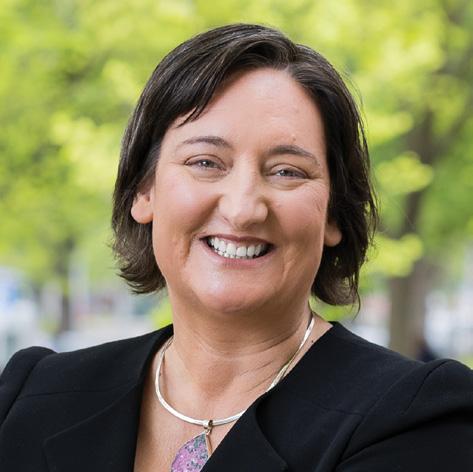
Professor Cassandra Szoeke BM, BS(GradEntry) ’99
Awarded for her distinguished leadership in dementia, women’s health research, and the influence of policy and guidelines internationally to improve healthy ageing.
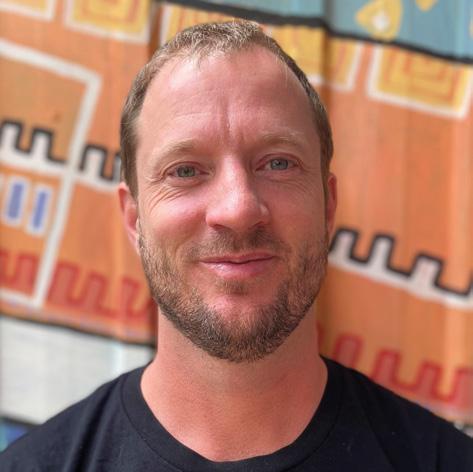
Dr Michael C Smith GradCertPHCDev ’12 PhD(BiomedEng) ’16
Awarded for his distinguished contribution to the health and wellbeing of people in remote Aboriginal desert communities through water-treatment systems for medical dialysis services.
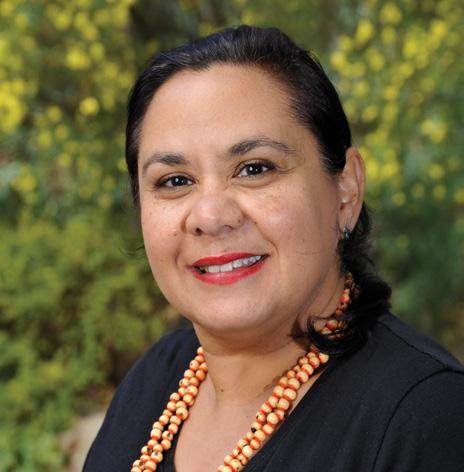
Professor Simone Ulalka Tur MEdSt ’02
PhD(EHLT) ’18
Awarded for her distinguished leadership in Indigenous advocacy both within South Australia and nationally, through art and education.
The Convocation Medal was established in 1991 and recognises graduates of Flinders University who have made a substantial and outstanding contribution to the local, national and/or international community.
“My education was an essential foundation for me to develop the skills I needed to not only become involved in our family business but also to play a role in the broader community.”
CAV. MAURICE CROTTI AO
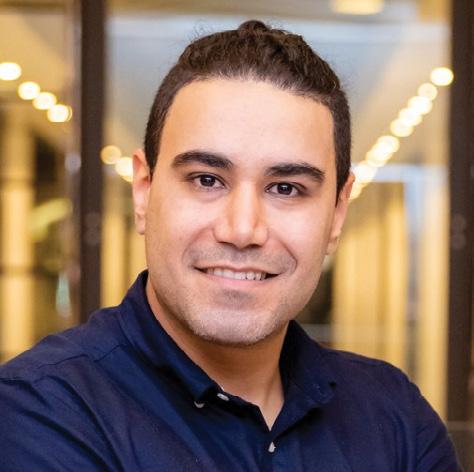
Dr Mehrdad Aghamohamadi PhD ’22
Awarded for his significant research in renewable and sustainable energy development models accelerating Australia’s net zero emission target.
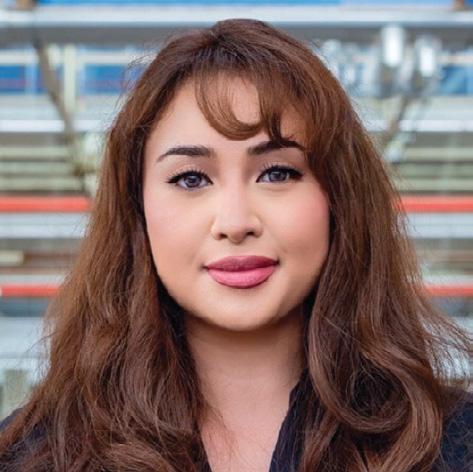
Dr Dhani Dharmaprani
BEng(Biomed)(Hons) ’16
PhD(Med) ’20
Awarded for her significant research in cardiac electrophysiology through the use of engineering techniques to further develop technologies improving cardiovascular health.
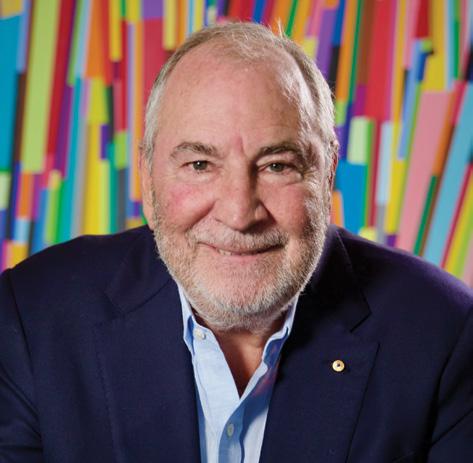
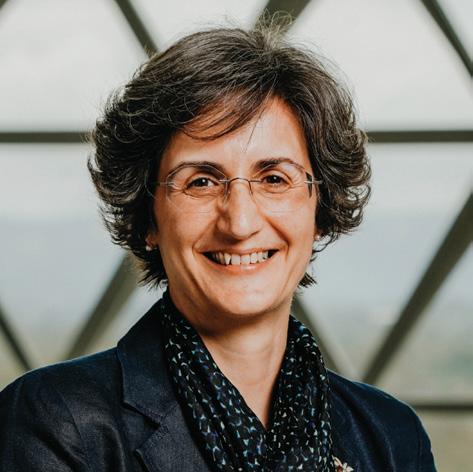
Cav. Maurice Crotti AO BA ’71
Awarded for his outstanding entrepreneurship and ambassadorship for food manufacturing, export and economic development in SA.
Professor Maria Makrides
BNutDiet(GradEntry) ’91
PhD(Med) ’95
Awarded for her outstanding leadership in translational nutrition research in the fields of pregnancy and perinatal health aimed at improving maternal-infant outcomes.
Professor Maria Makrides – SAHMRI
Professor Robyn Clark, Professor Bogda Koczwara AM and Madison Siegertsz – Brenton Edwards
Eloise Hall – Flashpoint Labs
Professor Cassandra Szoeke – Casamento Photography
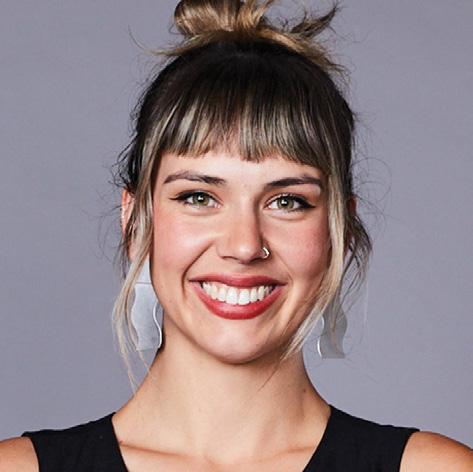
Eloise Hall
BIntRel/BBus ’23
Awarded for her significant entrepreneurship with the social enterprise, TABOO in addressing period poverty in Australia, ensuring everyone has equal access to safe and dignified period care.
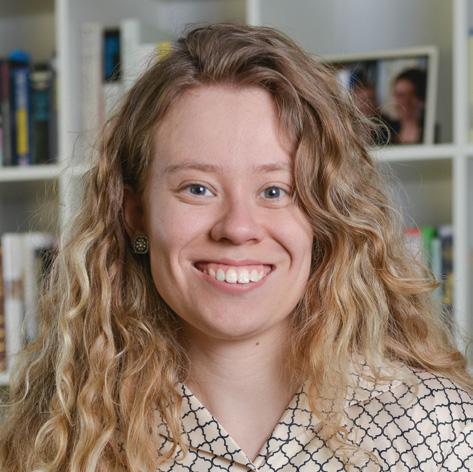
Madison Siegertsz
BCreatArts(Screen) ’20
Awarded for her significant contribution to the creative industries sector, showcasing South Australian talent and ensuring accurate representation of neurodiverse communities on screen.
BY LYNDA ALLEN
Australia is one of the safest places in the world for a baby to be born, yet stillbirth is relatively common with one in every 135 babies that reach the mid-point of pregnancy not surviving to birth.
It’s a devastating reality for more than 2,000 Australian families each year, and for a third of these deaths the cause remains unknown.
With a heartfelt desire to prevent stillbirths, molecular biologist Dr Anya Arthurs in the Pregnancy, Health and Beyond Laboratory at Flinders University has studied a possible cause – the ageing of the placenta.
Connected to the developing baby by the umbilical cord, the placenta provides essential oxygen and nutrients until the baby is born. When a pregnancy goes beyond the expected 40 weeks gestation or the placenta ages prematurely, the placenta can degrade and no longer sustain the baby.
In a world-first study, thanks to a Flinders Early Career Research Seed Funding grant, Dr Arthurs investigated the cause of this ageing and has uncovered some important evidence.
She says, “The data suggests that specific circular RNA molecules in ageing placenta bind with DNA to cause damage that likely results in stillbirth.”
This significant discovery not only advances our understanding of stillbirths, but also offers hope for preventing them in the future.
“I’m now targeting circular RNA molecules from the study to reduce the DNA damage and prevent stillbirth. I’m also investigating how these circular RNAs could be used to detect pregnancies at risk of stillbirth – so they can be closely monitored and, if necessary, the baby can be delivered early,” says Dr Arthurs.
Imagine a future without the pain and devastation of stillbirth. Dr Arthurs’ research is bringing us one step closer to this reality.
Donor-funded Early Career Research Seed Funding grants provide essential support to emerging researchers like Dr Arthurs, enabling them to tackle critical issues that affect us all.
“This grant has made a world of difference to my career and will contribute to the safety and wellbeing of babies.”
Grateful for the community’s support, Dr Arthurs says, “From the bottom of my heart, thank you. The seed funding enabled me to complete critical experiments for my research study that I otherwise would never have been able to complete.”
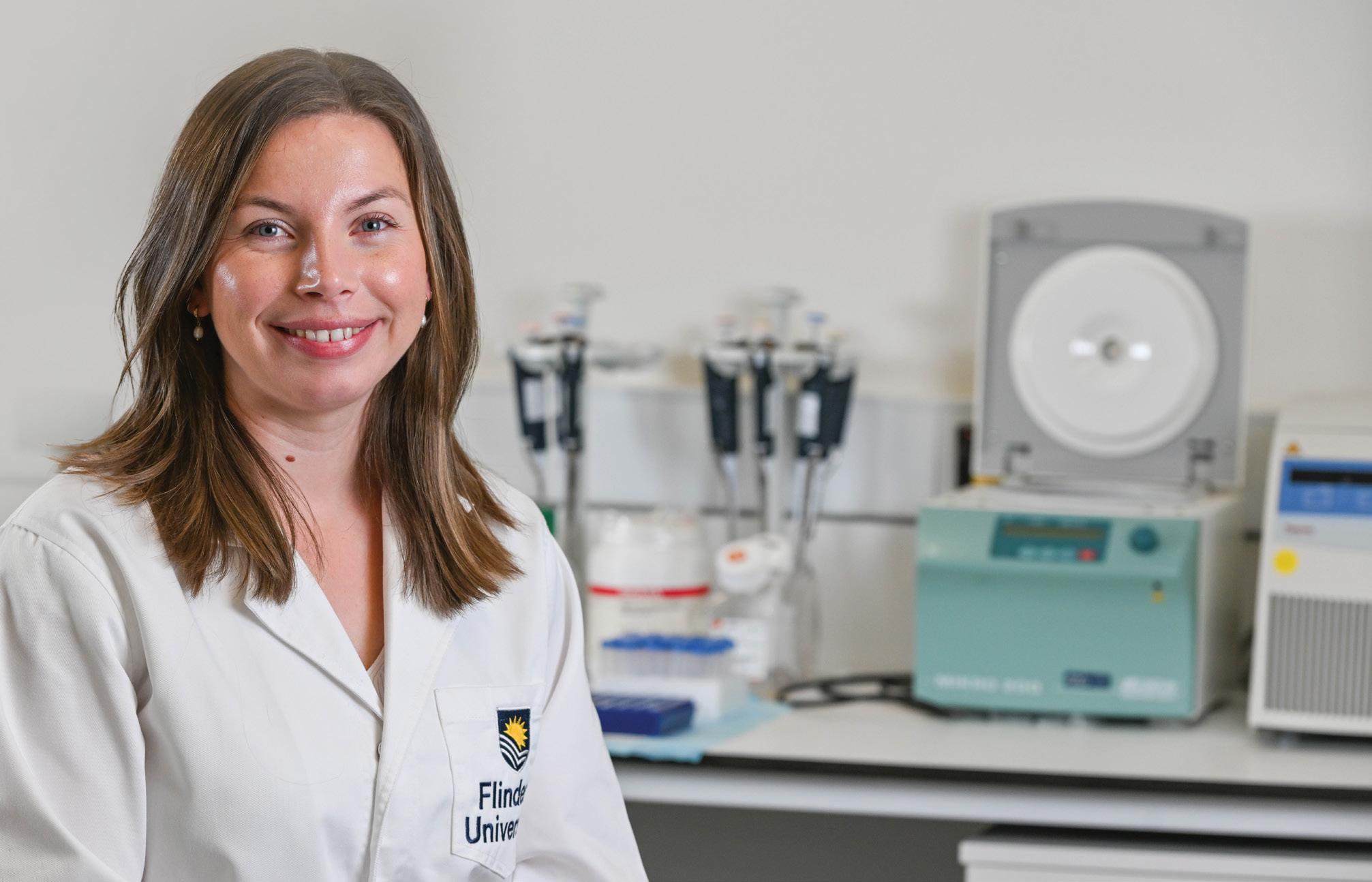
Flinders.edu.au/donate
BY LYNDA ALLEN
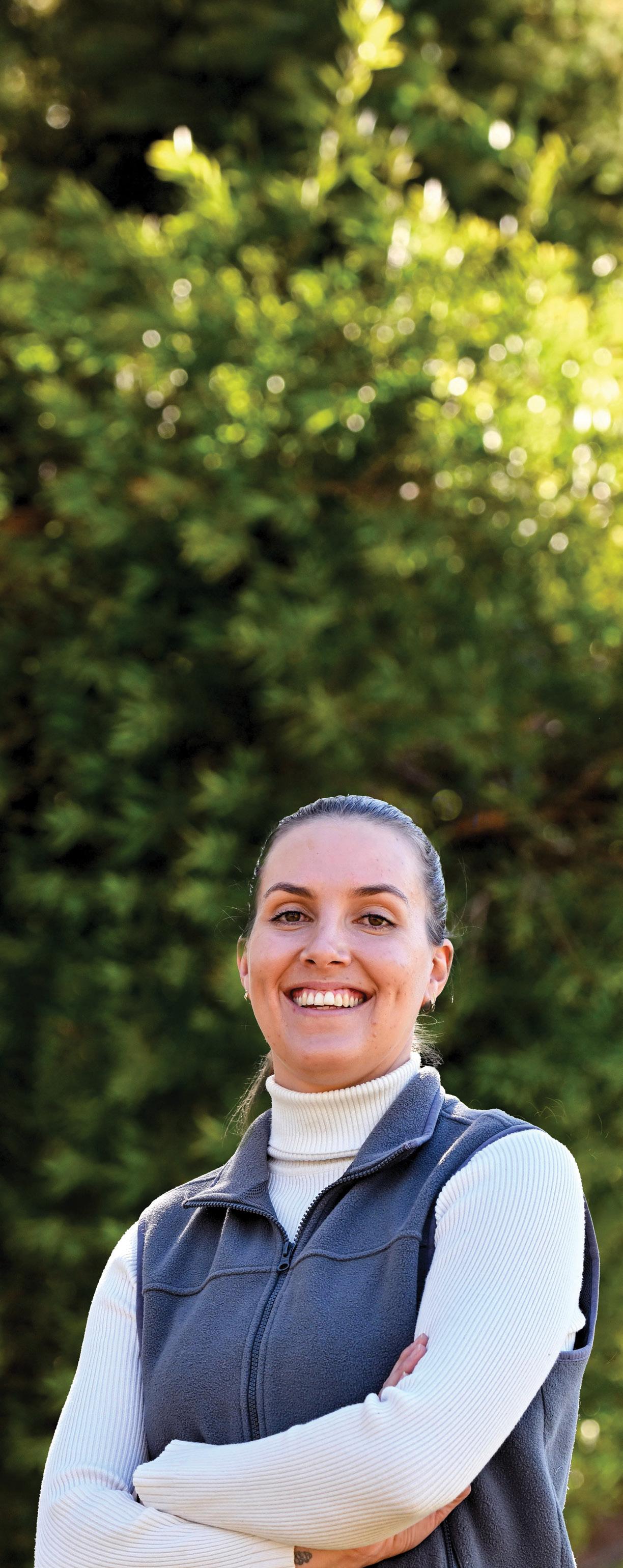
Chloe Stevens has always had a deep love of nature and the environment.
“I want to do all that I can to protect it,” says Chloe, who enjoys the hands-on fieldwork of her Bachelor of Science (Biodiversity and Conservation) at Flinders University.
“During my degree I have been able to work directly with wildlife through flora and fauna surveys, which has been incredibly rewarding and has deepened my passion for conserving biodiversity.”
To support herself during her studies, Chloe works part-time as a ranger with ForestrySA. She loves the diverse role, engaging with visitors during the camping season, and being part of conservation projects, including monitoring the presence of the southern brown bandicoot in our native forest reserves.
While this income helps, in the current cost-of-living crisis Chloe still finds it hard to make ends meet as she works towards the degree that will shape her future.
“Financial stress is by far the most difficult element of studying and being so stressed about money really impacts my mental health,” says Chloe.
Recently, Chloe hit a particularly difficult roadblock when her old computer needed upgrading so that she could download programs crucial to her studies – but she couldn’t afford the costly upgrade.
Being able to connect to the internet, download the latest software, and access course-relevant apps and subscription content are ongoing costs for students – on top of their increasing living costs.
Chloe knew she couldn’t continue her studies without being able to access course content on her laptop and was overwhelmed by the financial pressure.
But thanks to community support, Chloe received a Matthew Flinders Scholarship and the essential funds needed to upgrade her computer and continue her degree.
“Because of the Matthew Flinders Scholarship, I feel as though I can breathe for the first time in a while.
This scholarship is honestly lifechanging right now – I cannot thank the donors enough.”
Thanks to donor support Chloe is now looking forward to a future doing what she is so passionate about – protecting wildlife.
Provide vital support for students to continue their studies by giving to the Matthew Flinders Scholarship.
Flinders.edu.au/donate
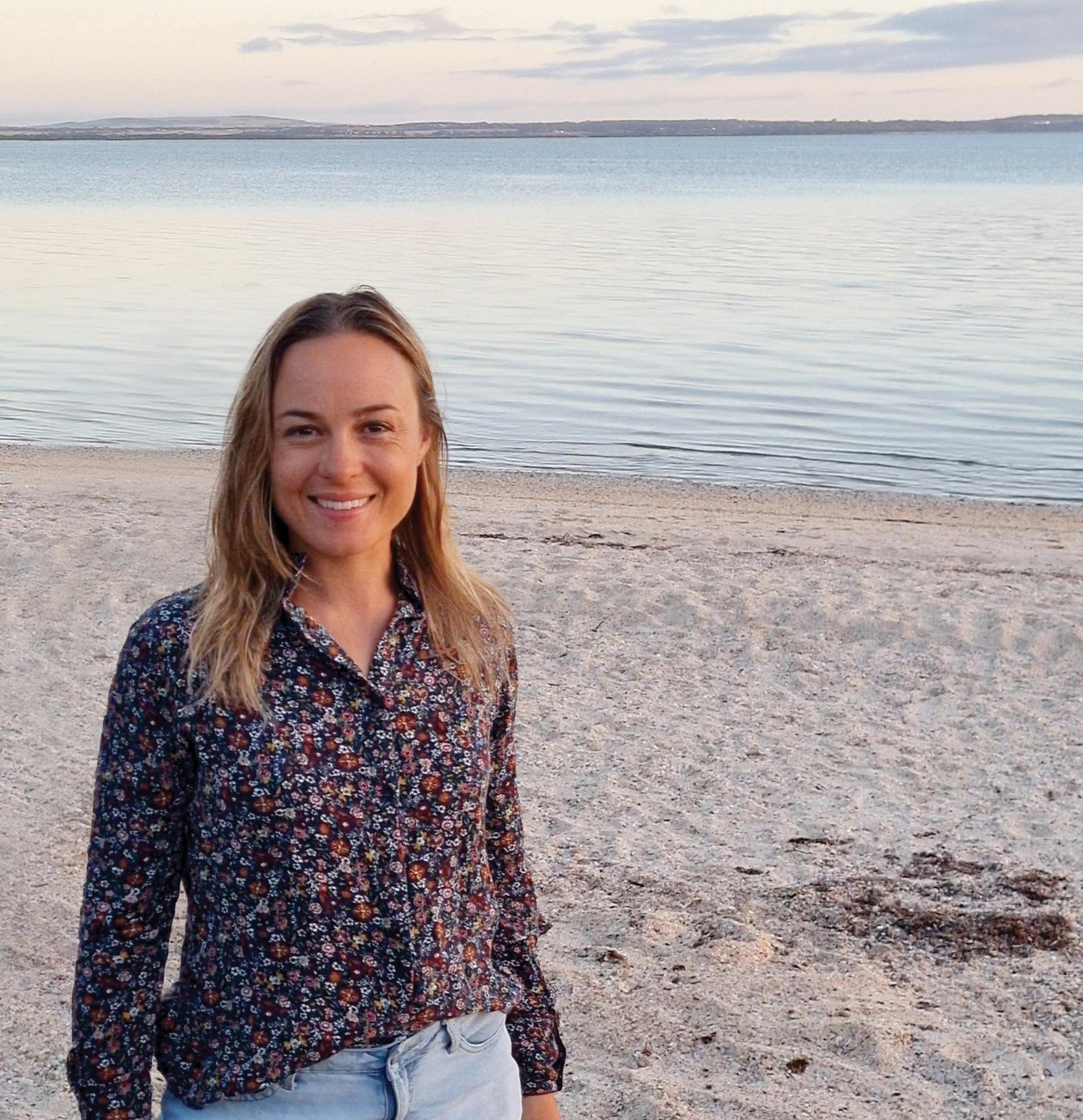
BY DAVID SLY
Reaching the first year of her PhD in Earth Sciences (Coastal) at Flinders University has required an incredible amount of grit and determination from 34-year-old Enya Chitty, as well as the financial support of two donor-funded scholarships.
Pursuing university studies as a single mother living on Kangaroo Island has proved especially difficult for Enya, but she has prevailed and triumphed with help from the Jessie Cooper Scholarship for Women and the Weise Foundation Scholarship.
These donor-funded scholarships enabled Enya to cover travel expenses necessary to commute regularly from Kangaroo Island to Flinders’ Bedford Park campus to achieve her Bachelor of Science (Honours) Enhanced Program for High Achievers (Coasts and Oceans).
It represents a remarkable turnaround for Enya, who says she lacked direction as a teen and subsequently dropped out of high school after being told that her performance and decisions, at the age of 16, would make or break her success in life.
When she finally did commence tertiary studies in 2020 as a mature age student, her resolve was severely tested.
“In my first year of study, while travelling back and forth to Flinders, I was also home schooling my two kids while building an off-grid house. My family lived in a shed without power and running water, and I studied using solar panels to run the laptop. Then in my third year of study I was diagnosed with ADHD, after my kids were diagnosed,” she explains.
“Finding the money, time and energy to travel to campus has been overwhelming, plus finding friends and family to accommodate me in Adelaide so regularly was an added pressure.”
Since 1994 the Jessie Cooper Scholarship for Women has changed the lives of many women who commenced university studies later in life – assisting them to finish their degree and work towards their career goals.
Marking 100 years of South Australian women gaining the vote, the scholarship was named in honour of Jessie Mary Cooper (191493), the first female Member of the Legislative Council in South Australia and a founding Council Member of Flinders University.
The scholarship was created by the former Flinders Alumni Association to address the growing concern of retention rates of women in their final year of study, and to support students like Enya to continue their studies.
Flinders University Law and Commerce graduate Jack Weise is also keen to provide support for students to continue their studies. In 2022 he created the Weise Foundation Scholarship to help students facing financial challenges, especially refugees, single parents, and Aboriginal and Torres Strait Islander students.
Jack, a Senior Legal Counsel who now works in Singapore, says he hopes his contribution can provide the same type
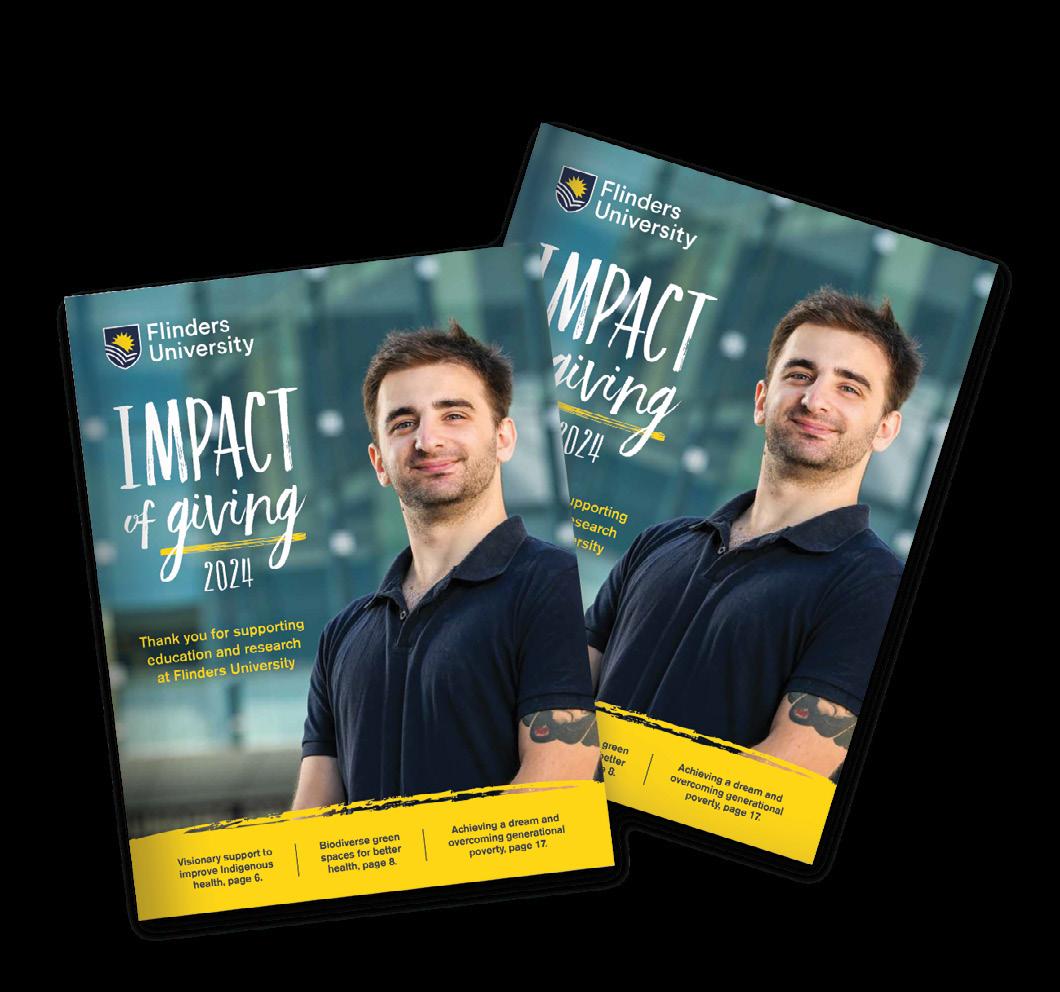
of study opportunities that have propelled his career to international success.
Such support has proved critical for Enya, whose mettle continued to be tested during her Honours studies in 2023. She spent more than a month caring for her family while they had COVID, moved house unexpectedly, suffered from pneumonia after contracting Influenza B, and spent six weeks hobbling about in a moon boot after a surfing accident.
“At times life is chaotic and bizarre, but there is always a way forward,” says Enya.
“These scholarships provided a way forward. They were a big help to me, and I am grateful to the donors.”
Recognition for her efforts has also provided momentum. In 2023 Enya won the Soroptimist International Southern Districts of Adelaide Prize for High Achieving Women, along with the John Lewis Prize for Excellence in Undergraduate Geography from the Royal Geographical Society of South Australia, for each year of her undergraduate degree.
Enya is now excited to commence her PhD at Flinders researching seagrass restoration. Funded by SA Water and led by Flinders University’s Associate Professor Graziela Miot da Silva, this project is an important aspect of nature-based solutions for climate change adaptation in South Australia’s coastal waters, which could have global implications.
“I chose to study coastal science as I feel strongly connected to the coast,” says Enya.
“Humanity is deeply reliant on coastal systems. Half of the world’s cities are sited on estuaries, two-thirds of all people live within 60 kilometres of the coast, and 40 percent of the world’s coastlines are degraded. As such, nearshore coastal environments have a critical role to play in climate change mitigation and adaptation, presenting some of the greatest challenges, and opportunities, now and into the future.
“I hope that contributing to research in this field will help not only the environment and economy, but also marginalised coastal communities. I want to create practical applications that will enhance the future of these communities.”
Set over eight levels, every aspect of Flinders City Campus at Festival Plaza has been designed with purpose and possibility in mind. Collaborative, stateof-the-art learning areas and open-plan event spaces deliver the optimal learning experience, while Flinders’ innovative curriculum provides opportunities that extend far beyond traditional study.
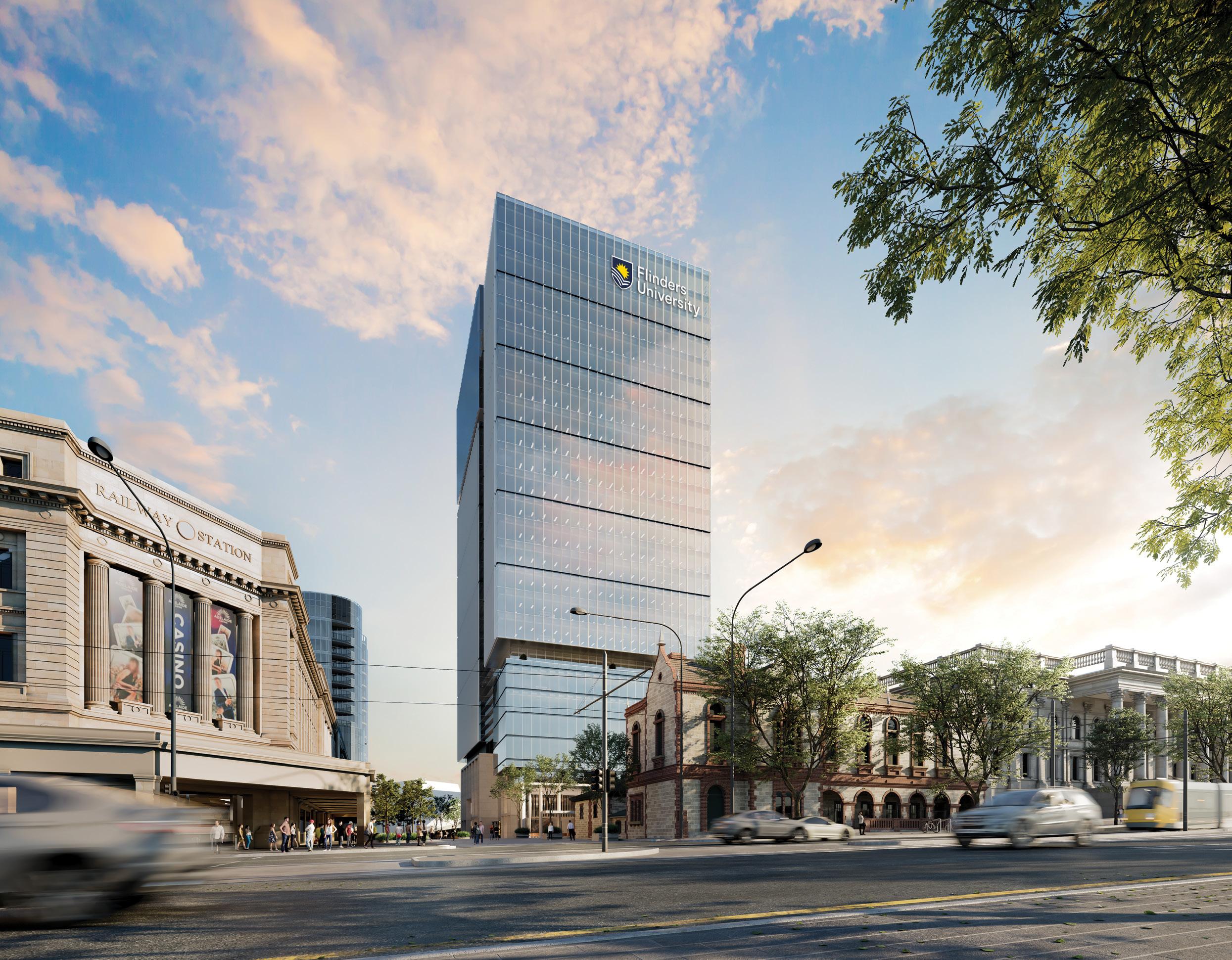
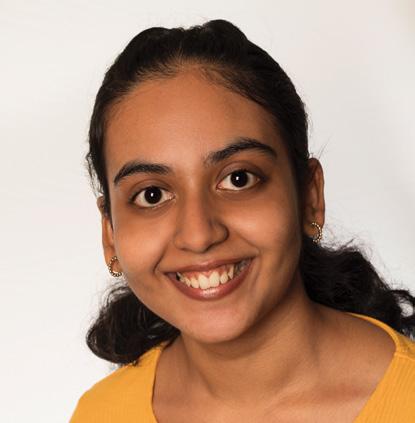
We caught up with MBA (Marketing) student Shreya Rajesh to hear what it’s really like to be part of the first cohort studying at Flinders in the city!
Why did you choose to study at Flinders?
The University offers exceptional opportunities for skill development and practical industry exposure through the Work Integrated Learning program built into every Flinders business course. This will help me to learn the latest business concepts in marketing, thereby preparing me for a wide range of career opportunities.
How have you found the collaborative learning spaces compared to traditional lecture theatres?
Learning in a collaborative space has been incredibly enriching, and the atmosphere fosters a sense of togetherness between the professor and the students, encouraging enhanced learning.
Have you been able to study with others easily, using the facilities on offer?
Yes, definitely. It’s incredible that the entire fourth floor of the City Campus is dedicated to study spaces. This has been really convenient for me to work on my assignments individually and collaboratively with my group.
Explore our range of courses
What do you want to do after graduating and how will studying at Flinders help get you there?
After graduating, I aim to pursue a career in marketing management. Studying at Flinders will be instrumental in achieving this goal due to its comprehensive MBA program. Additionally, the connections and network I will build at Flinders will be crucial in opening doors to various career opportunities and professional growth.
“The ability to easily access all facilities, such as the University library and study spaces, is the best part of being able to study in the city. A personal bonus is that I save time on travel!”
SHREYA RAJESH, MBA (MARKETING) STUDENT
In mid-June, our new Health and Medical Research Building (HMRB) in Bedford Park was officially opened by ViceChancellor Professor Colin Stirling, Prime Minister Anthony Albanese and South Australian Premier Peter Malinauskas.
“Flinders is redefining healthcare,” said Vice-Chancellor Professor Colin Stirling. “The HMRB is a major leap forward, building on Flinders’ 50-year legacy of health innovation. It supports our rapid research growth and paves the way for discoveries that solve challenges and improve lives.”
Premier Peter Malinauskas said boosting the quality and volume of research undertaken in South Australia is fundamental to increase the complexity of our economy. “This is the key to unlocking a better standard of living for all South Australians. To this end, Flinders University is a leader. It has posted the strongest growth rate in research income of any university in the country across the past five years.”
“The research undertaken at this incredible new facility will help save lives.”
PREMIER PETER MALINAUSKAS
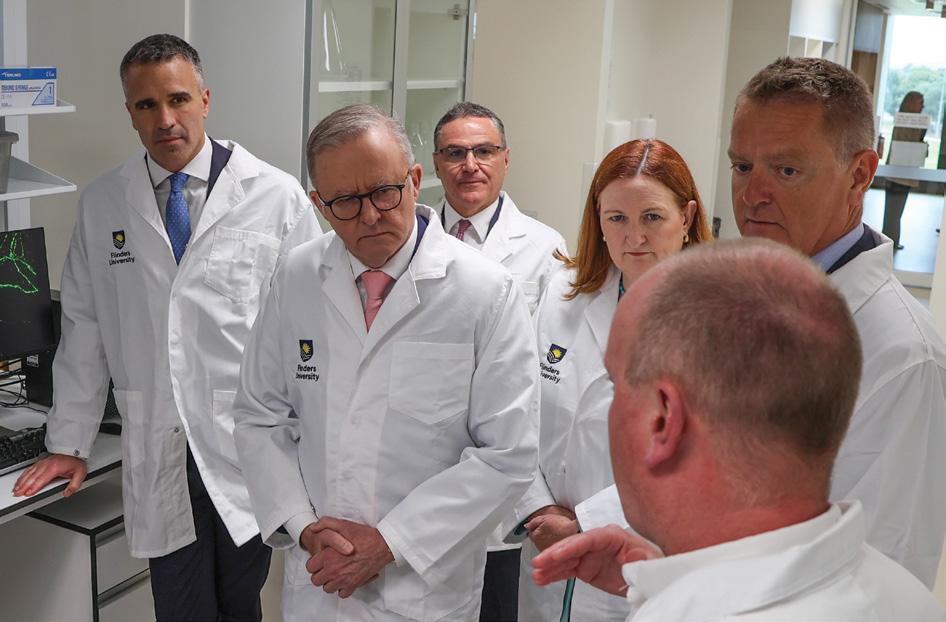
The $280 million facility is the first building in the planned Flinders Village development. As the centrepiece, it spans 22,000m2 over 10 storeys, with space for over 600 medical researchers, clinicians and support staff.
Located just 50m from the Flinders Medical Centre and Flinders Private Hospital, the HMRB provides a unique relationship between research, education, clinical expertise and community and is the focal point of research informed by genuine patient need, positioned to make an immediate improvement to people’s lives.
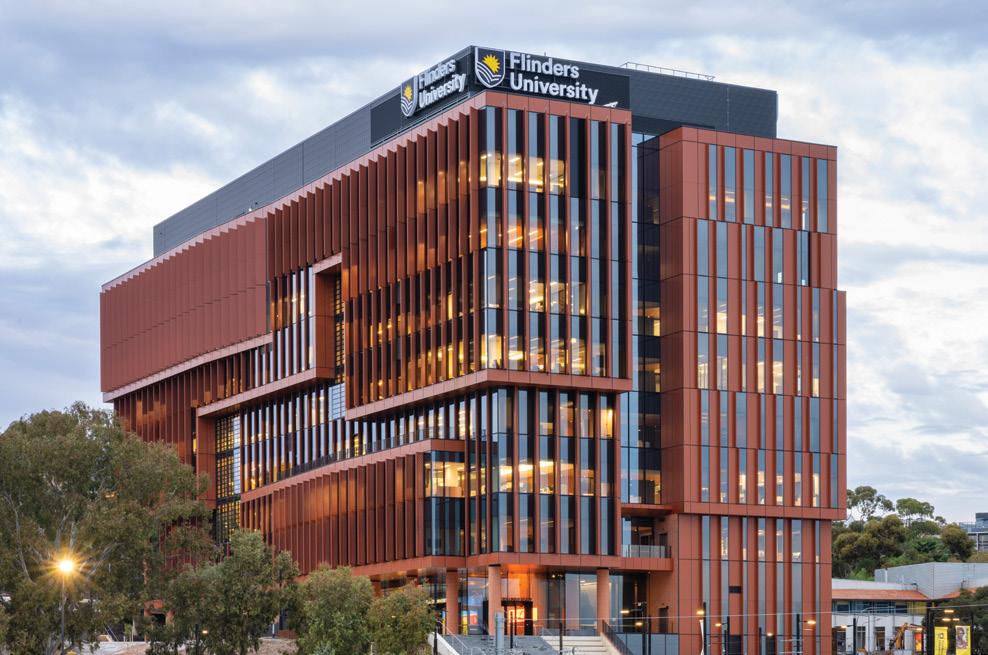
Health and wellbeing are central to the HMRB’s mission, reflected in its design and location. Open indoor spaces feature greenery and promote natural light and circulation of fresh air. Outside, an Indigenous bush medicine garden and native landscaping line the new gateway to campus from Station Plaza to University Drive.
The HMRB has already achieved a Platinum rating under WiredScore certification, making it the first medical research institute in the world to receive this rating.
The HMRB is a once-in-a-generation initiative which will transform how we understand, diagnose and treat illness. Research work underway includes gut health and genetic factors affecting proteins, pregnancy health, virology and the human genome, and the development of targeted cancer treatments. For example, Dr Claire Jessup (BBiotech(Hons) ’99, PhD(Med) ’05) and her team are developing new treatments for women with ovarian cancer. “The facilities in the HMRB allow us to investigate particular aspects of ovarian cancer that may unlock our ability to one day offer effective immunotherapies to people facing ovarian cancer,” said Dr Jessup. “The opening of HMRB means the future looks promising for ovarian cancer research in Australia.”
Associate Professor Luke Selth (BBiotech(Hons) ’05) and his team are focussed on improving outcomes for men with prostate cancer. “It’s important to remember that the HMRB sits within a broader precinct that encompasses the Flinders Centre for Innovation in Cancer, Flinders Medical Centre and Flinders Private Hospital, which enables us to engage with clinicians and patients on a daily basis and is an incredible environment for undertaking impactful cancer research.”
The HMRB is a defining achievement in Flinders’ history; a landmark investment in the health and wellbeing of all South Australians and the next step in undertaking research that will change lives and change the world.
The world we know is unpredictable, dynamic and exciting, with opportunities around every corner. So, what are you waiting for? If you’ve been thinking about leadership programs, now is the time – to advance your career, boost your qualifications, and put your future first.
If you want to upskill and sharpen your knowledge, Flinders has everything from a world-class suite of MBA courses, to innovative postgraduate government offerings, to a Juris Doctor that will give you the opportunity to add valuable legal skills to your repertoire – and that’s just the start. Plus, as a Flinders alum you’ll receive a discount off your tuition fees for selected courses!
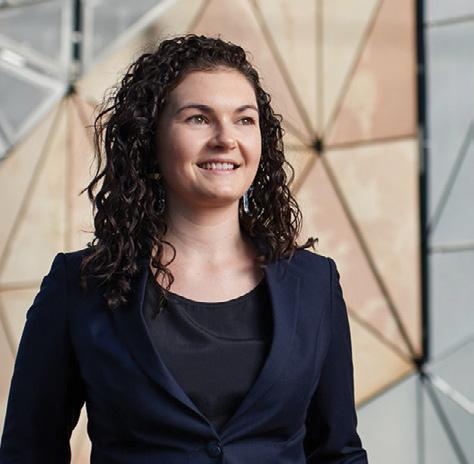
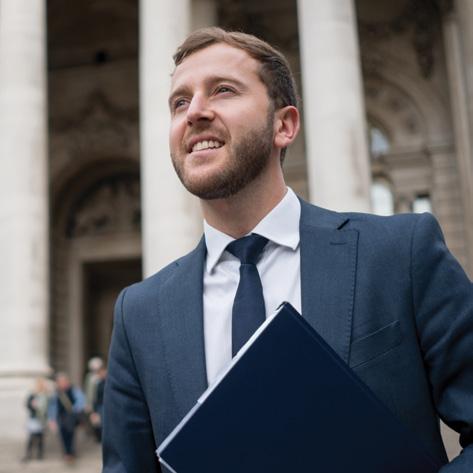
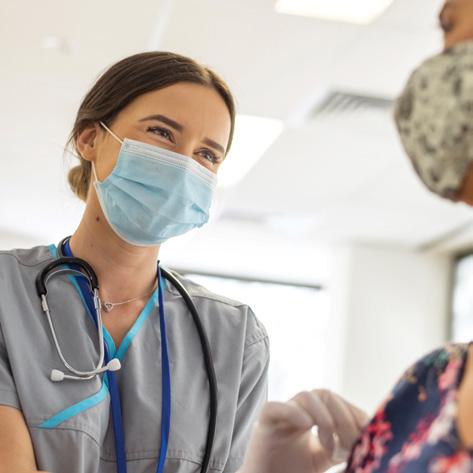
The Juris Doctor is a law degree for non-law graduates. It’s a prestigious, masters-level legal qualification that’s widely recognised throughout the world, and the only law degree in South Australia accredited to be delivered 100% online.
This is the fastest way to complete an MBA. With three study periods to choose from, you set the pace. You’ll graduate with skills that will see you embracing leadership roles in international organisations, social enterprises, governments and not-for-profits.
Explore and redefine public health practice to promote health in light of contemporary knowledge. The teaching and learning focuses primarily on helping health professionals change their practice by applying new insights.
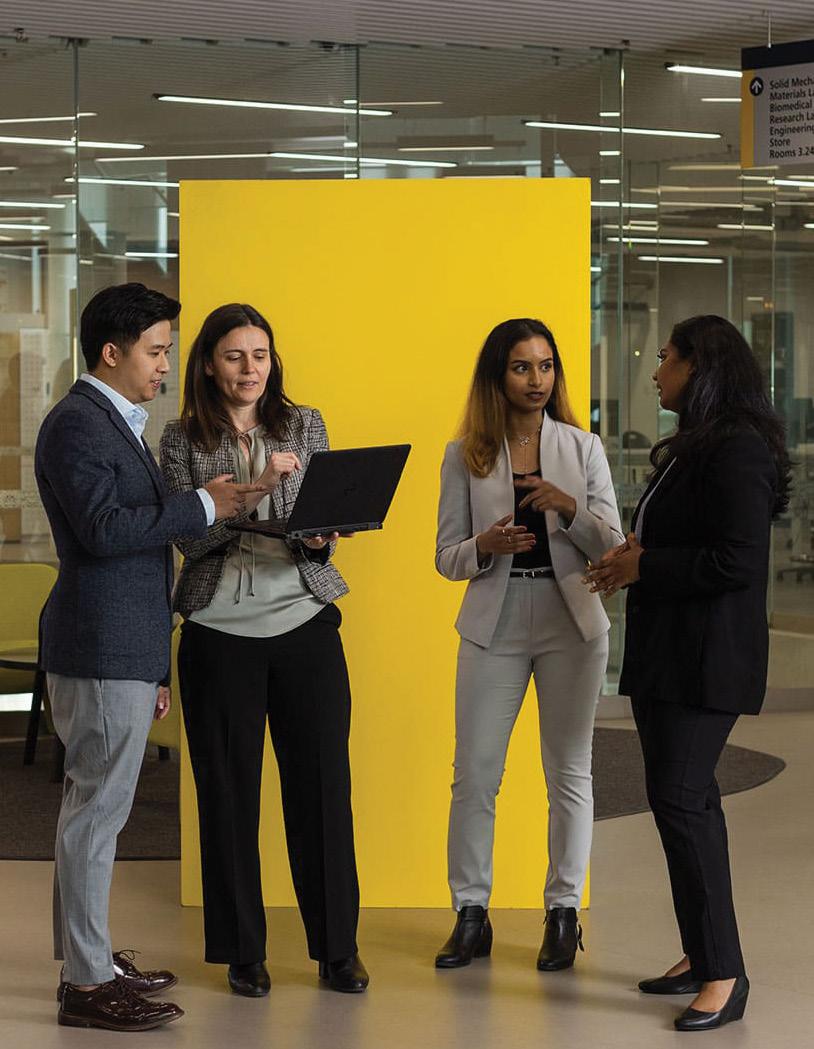
Other study options:
Health Administration
Accounting
International Law and International Relations
Engineering Management
Policy and Government
PhD-MBA
Social Impact
Digital Health Management
Business Analytics
Marketing
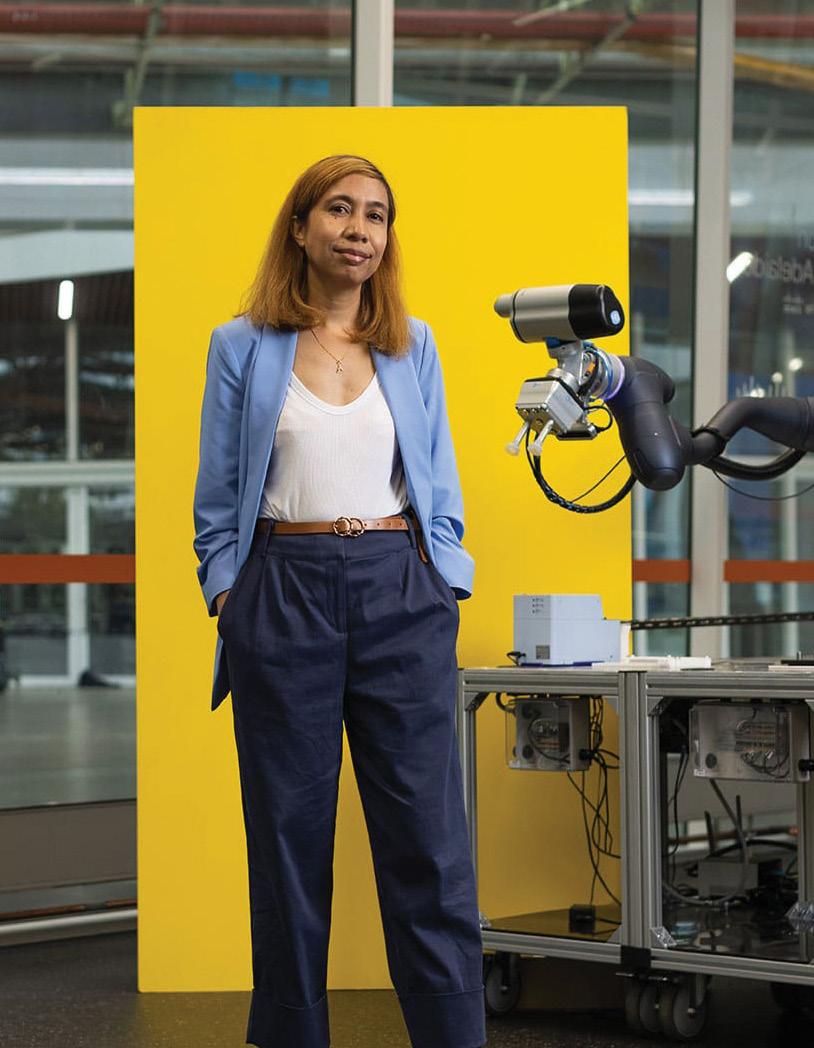
The Up the Hill Project – inclusion for people with a disability in university
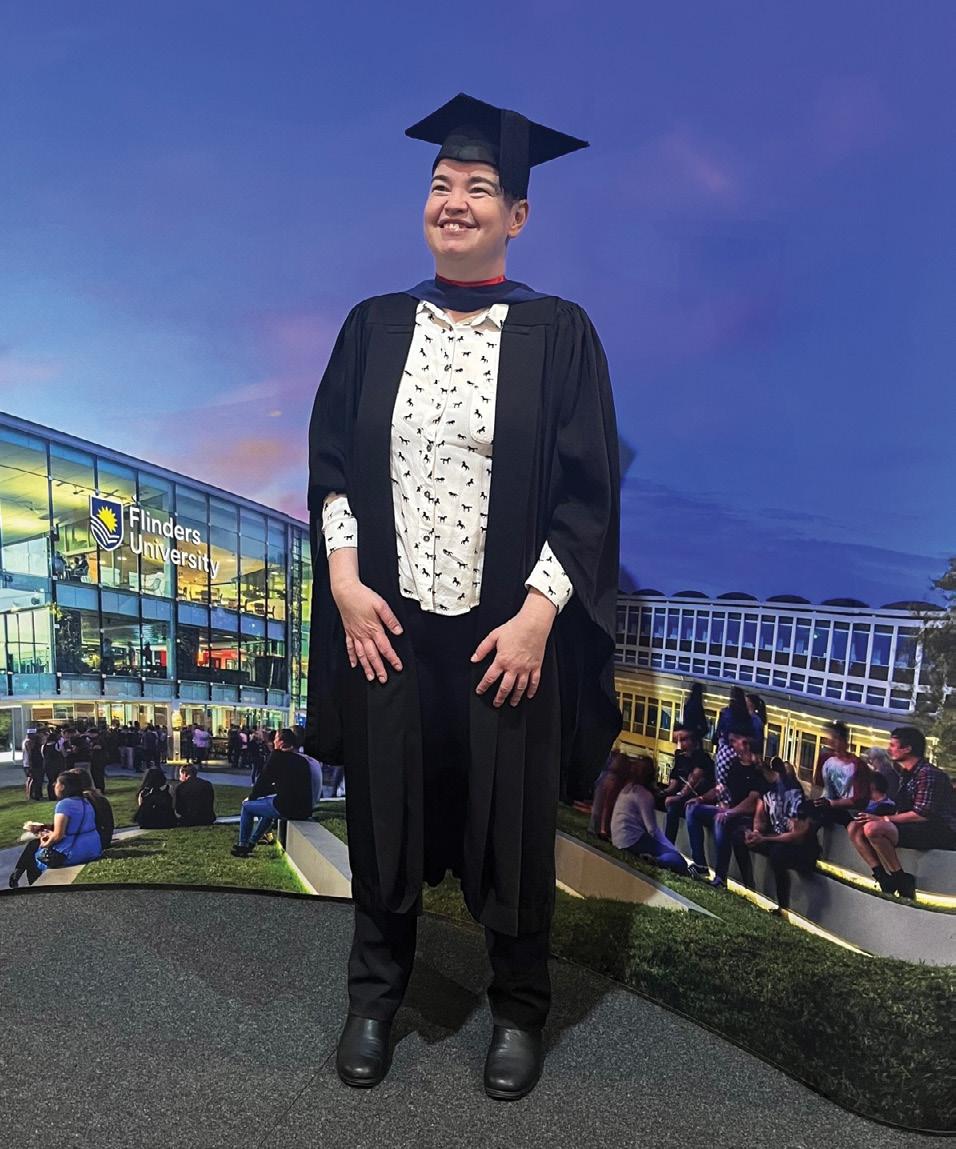
Flinders University’s Up the Hill Project encourages the participation of adults with intellectual disability, in the social and educational life of Flinders University.
The Project aims to provide an inclusive opportunity for people with a disability, with support from a learning partner, to access the University environment, develop skills and networks, and experience a range of educational opportunities and activities.
We spoke with Academic Project Advisor, Dr Fiona Rillotta about the project.
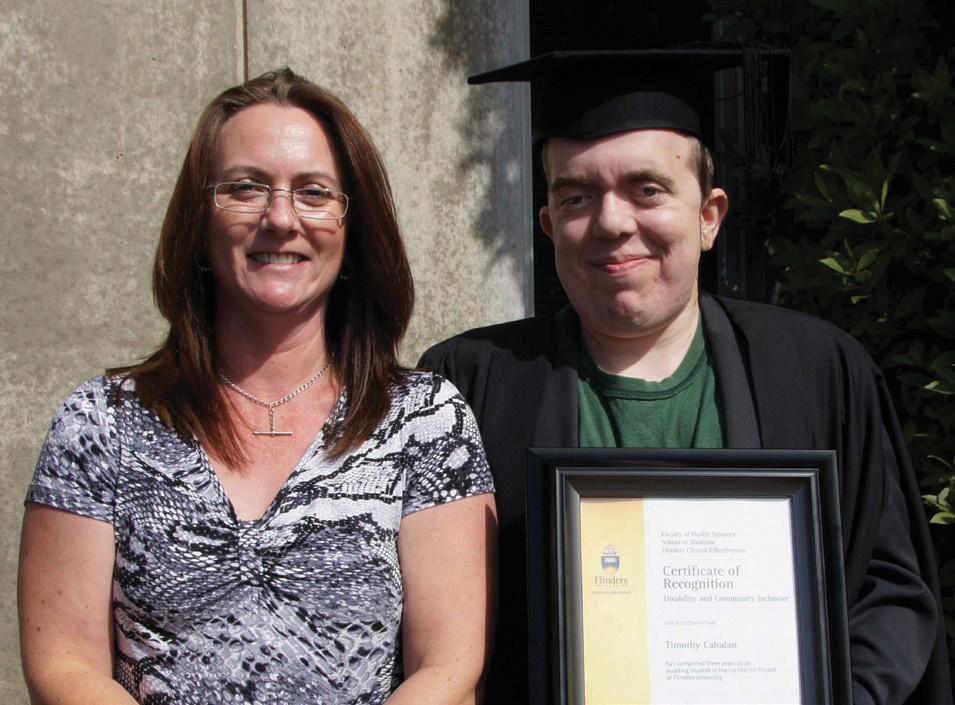
What do Up The Hill Project participants do?
Participants attend university topics of their choice to learn new things, develop skills and work towards future opportunities.
At the start of each semester, participants will nominate topics in which they are interested. Learning partners work with participants to be involved in one of their nominated topics. This peer support aims to enhance participation and inclusion at university for everyone.
What is most rewarding for you about the Up the Hill Project?
Watching the participants’ enthusiasm, learning, and personal growth overtime, as well as all the things that participants teach their learning partners.
I also like hearing about inclusive teaching practices by the teaching staff, and how participants join in with class group discussions, activities, and assessments with peers.
Are there any major accomplishments that stick out in the past 25 years?
There have been many. Some of the biggest developments have been about making sure that Up the Hill Project participants have the same university experience as their peers, including: choosing topics of interest from across the whole university (the program started out with just disability degree topics); accessing online learning systems; student ID card access; and graduation ceremonies.
What do you hope to see happen in the next 25 years of the Up the Hill Project?
We really hope to strengthen the pathways for participants and graduates beyond what the Up the Hill Project is currently offering, so, to be able to provide support with transitioning to further study and/or employment opportunities. We also hope to have a structure so that participants who wish to embark on a degree qualification have the opportunity to do so in a supported way.
“I’m so excited to have graduated from Flinders. The three years I spent there was thoroughly fulfilling and an enriching experience. I learnt new things about topics I’ve researched over and over again before starting out at Flinders.”
TIM, UP THE HILL PROJECT GRADUATE
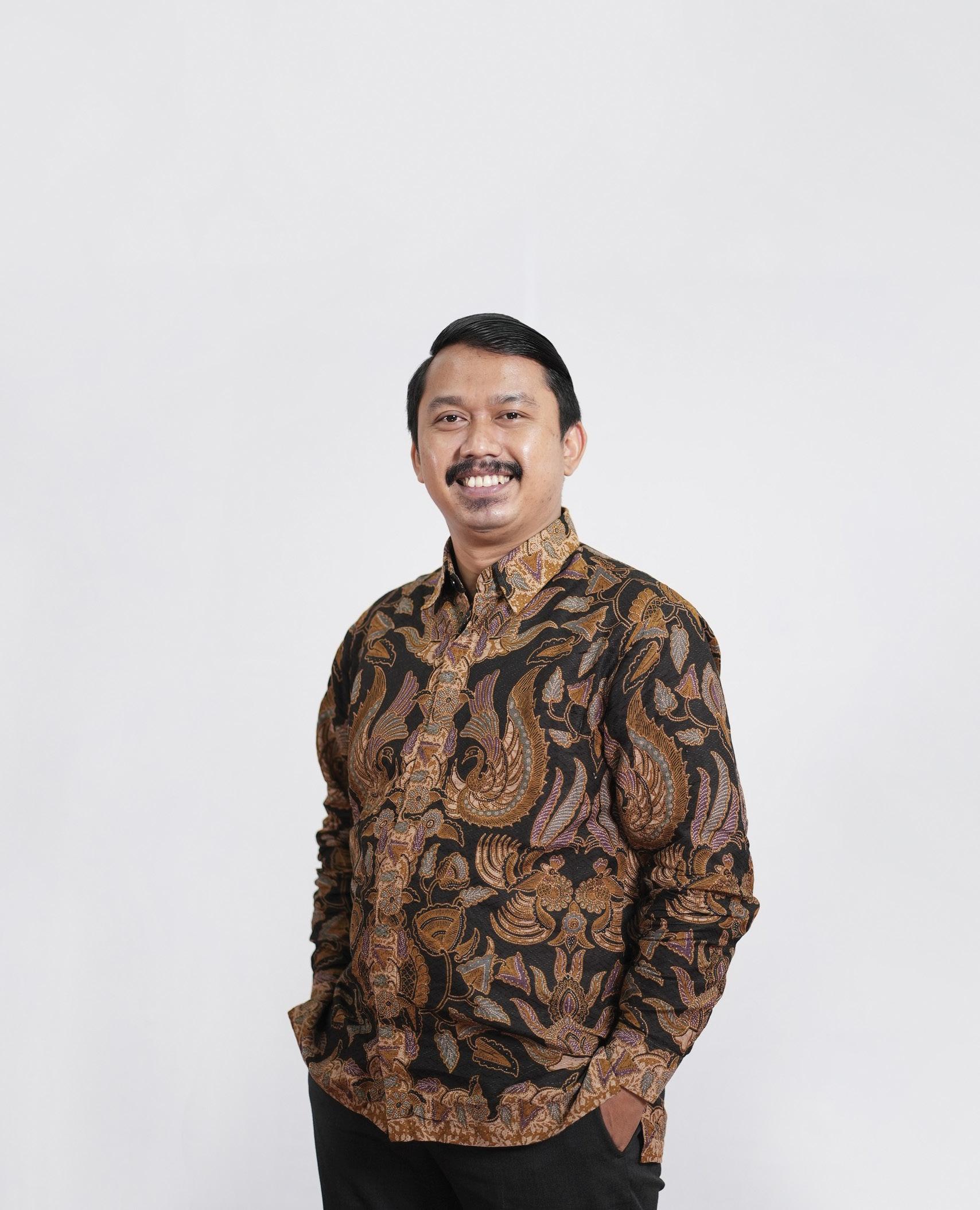
BY LEONARD ROWE
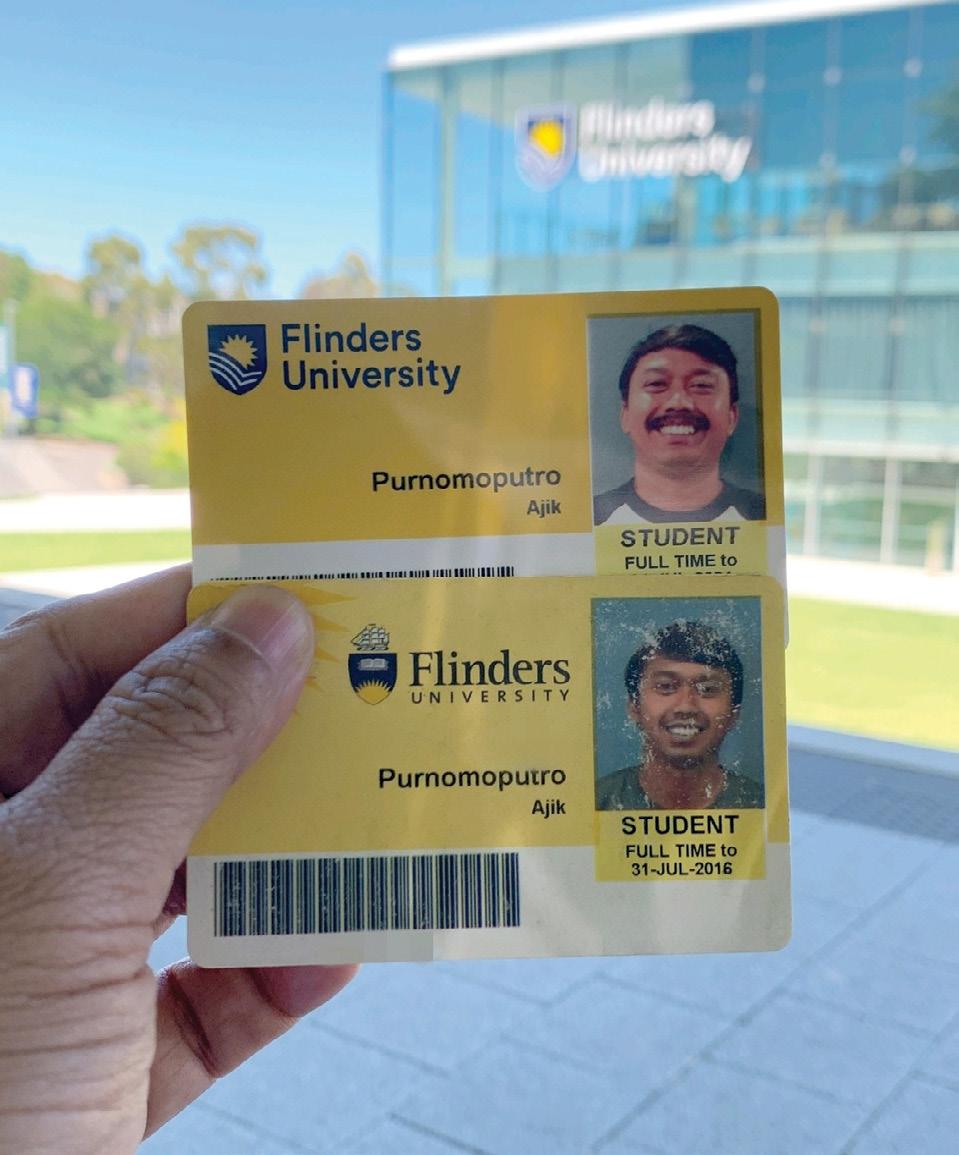
After graduating from Flinders University in 2016, Ajik Purnomoputro (MPubAdmin(Pol) ’16) returned to his homeland of Indonesia to apply the education he had gained through an amazing opportunity of study assistance – the Australia Awards Scholarship.
These awards are highly sought after overseas, as the living allowance is considered sufficient for recipients to truly focus on their studies. Ajik reaped the benefits of learning and is now back at Flinders again to complete his PhD, with the hope of making further impact on the bonds and investment issues faced by everyday Indonesians.
“Professionally, my degree gave me a competitive advantage over other employees for managerial positions in the Ministry of Finance, which resulted in my promotion to Head of Section, Debt Market Development,” says Ajik.
“In that position, I was required to develop the bond market in Indonesia, which at that time was still far behind some of its peers. Some of the courses I took at Flinders really helped me to find the source of the problem, provide alternative solutions and implement solutions that are acceptable to all parties.
“The network that I built when studying at Flinders was also another gift for me as Flinders alumni are in almost every institution, which facilitates me to coordinate through agencies.
“Personally, living in a multicultural Adelaide society as a minority changed my perspective on how we have to respect others and I thank Flinders so much for that.”
Ajik’s dream of undertaking a PhD became a reality this year. Already having experienced the learning environment, the city of Adelaide and his supervisor’s academic expectations, it was an easy decision about where he would choose to return to study after being awarded his second Australia Awards Scholarship.
“I immediately decided to return to Flinders, even though I had to go through the Graduate Diploma of Research Methods as a pathway to my PhD,” says Ajik.
“My research during my PhD is related to the phenomenon in Indonesia where individual investors in sovereign bonds are far behind investors in stocks and mutual funds.
“In addition, Indonesia is also rife with investment scams. This makes me want to examine the influence of financial literacy and Indonesian culture of collectivism in the small number of government bond investors.”
Once Ajik returns to Indonesia, the results of his research findings are expected to create a government bond scheme that is in line with public demand, so that the investor base of government bonds can increase.
Ajik also plans to return to teaching at Polytechnic of State Finance STAN (PKN STAN), located in Banten, Indonesia. He has adopted and applied an egalitarian relationship between lecturing and his students, making the class as supportive as possible for student development.
“My favourite thing about Flinders is the supportive environment. Everyone wants us to succeed and we get full support from the campus for that.”
“Sitting beside the plaza, looking at the beach in the distance, while eating spicy noodle soup is always a favourite moment. Even better after finishing and submitting our assignments!”
More than 1100 Australia Awards scholars from more than 45 countries have graduated from Flinders University in the past 10 years. Administered by the Department of Foreign Affairs and Trade, Australia Awards are prestigious, transformational scholarships and short courses offered to emerging leaders from developing countries for study, research and professional development in Australia and the region so they can return home and contribute to their nations’ development, prosperity and resilience.
Scan the QR code to learn more about Australia Awards at Flinders.
BY BILL CONDIE
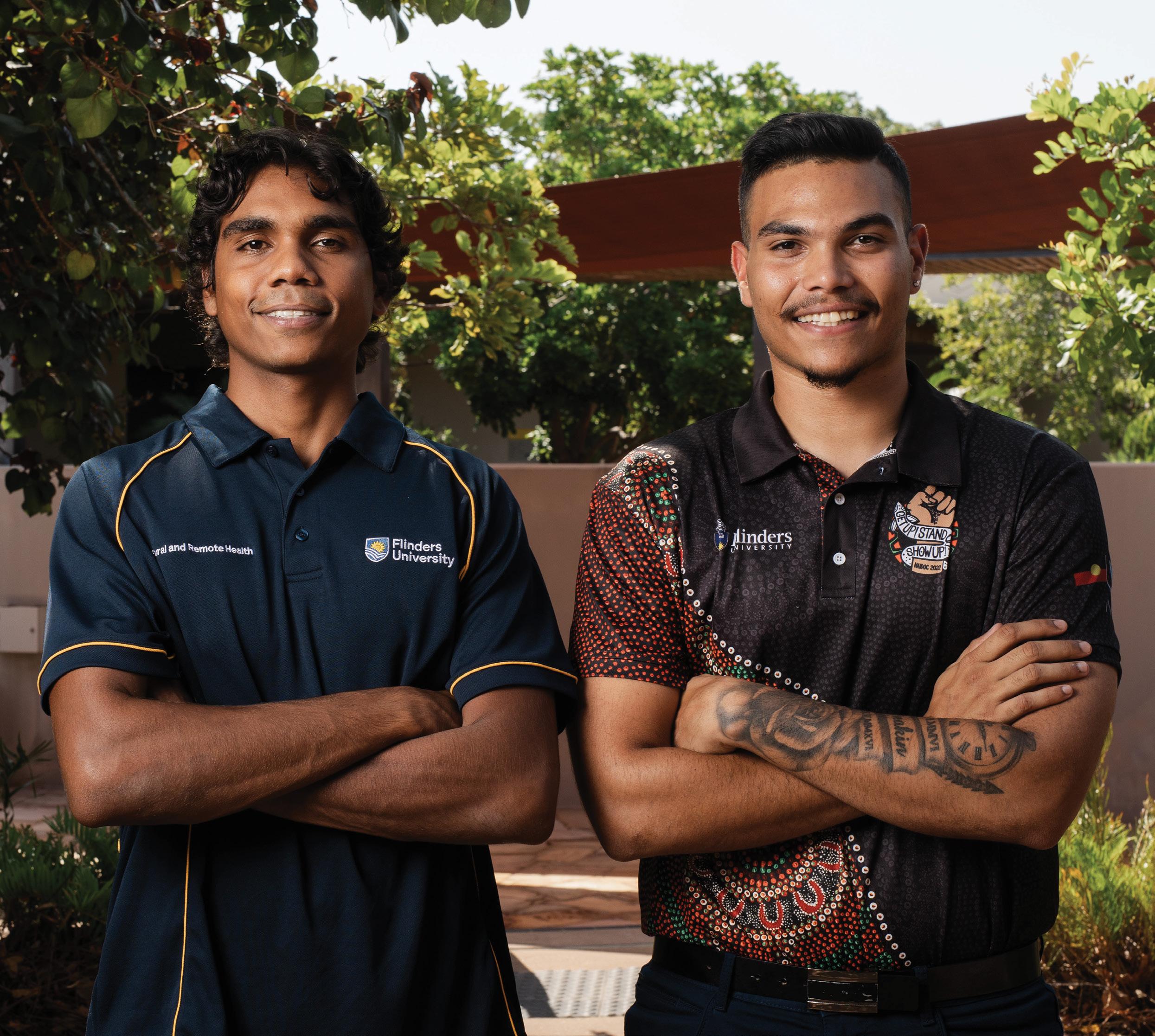
We will never close the gap in Indigenous health unless we engage with the men, says Professor James Smith.
For Professor Smith, his career-long interest in men’s health will hit a new milestone this year when he partners with the Movember Institute of Men’s Health for its long-term, largescale evaluation of Indigenous men’s wellbeing across Australia, Aotearoa New Zealand, Canada, and the US.
Professor Smith, Dr Kootsy Canuto, Associate Professor in Aboriginal Torres Strait Islander male health and well-being, and their team will co-lead the evaluation of the Australian arm of Movember Foundation’s Indigenous Social and Emotional Wellbeing Initiatives program, which is aimed at combating the health inequalities faced by Indigenous men through holistic community-driven approaches.
“We will carry out the evaluation over a five-year timeframe,” says Professor Smith. “It’s a significant investment by Movember and, sadly, it's urgently needed. Indigenous men everywhere experience higher rates of chronic disease, mental ill-health, earlier mortality, and substance use issues than the wider community. We need appropriately tailored health programs and services to better meet their needs.”
Professor Smith is no stranger to the problem. As the Deputy Dean of Rural and Remote Health – NT, and Matthew Flinders Professor (Health and Social Equity) at Flinders University, he has 20 years of experience working in men’s health, with much of his work focused on improving Aboriginal and Torres Strait Islander health and education outcomes in South Australia and the Northern Territory.
“We’re focused on growing Aboriginal and Torres Strait Islander researchers and research staff and building strong, meaningful relationships with Indigenous communities,” he says.
Professor Smith has always had a deep interest in men’s health since his undergraduate studies in human movement at the University of South Australia, where he completed a short course in men’s health.
“It was the first of its type in Australia and delivered by Professor Murray Drummond, who’s now also a Professor and Director of the Sport, Health, Activity, Performance and Exercise (SHAPE) Research Centre at Flinders,” says Professor Smith.
After university, he began working in a men’s health practice role at the Royal Adelaide Hospital before pursuing a PhD.
“At the same time, I was developing a stronger interest in concepts of health equity and recognised that there were some priority populations of men who were marginalised, who were very vulnerable from a health and social equity point of view. And that included Aboriginal and Torres Strait Islander boys and men.”
That led him 16 years ago to the NT where he could marry his interest in men’s health with Aboriginal and Torres Strait Islander health and well-being research, policy and practice, with Flinders colleagues.
“I’m really interested in doing the practical stuff,” he says.
Together with Dr Canuto, he is working with Jason Bonson and Cameron Stokes, both program managers in Aboriginal and Torres Strait Islander men’s health research.
One of their projects, called YBMen NT (Young Black Men, Masculinities, and Mental Health) is an initiative also funded by the Movember Foundation, that had its origins in the US with Black college men. Professor Smith was a Fulbright Senior Scholar in 2020, when he visited the Vivian A. and James L. Curtis Center for Health Equity Research and Training at the University of Michigan to learn more about this program.
“We’re adapting that for high school aged Aboriginal and Torres Strait Islander males. And we’ve been doing a lot of co-design work in that space to make sure we’ve got a curriculum that works as part of a hybrid face-to-face online social and emotional wellbeing education and support program for young Aboriginal and Torres Strait Islander fellas in the greater Darwin region.”
The other project, where Professor Smith works with Flinders colleague Dr Bryce Brickley, harnesses the Aussie love of sport. Called Aussie-FIT, it targets men aged 35 through to 75. It’s not solely for Indigenous men, although they have certainly been keen participants of the program.
Standing for Aussie Football Fans in Training, the program which is funded through a Heart Foundation Behaviour Change Strategic Grant engages men through a sports setting – not just athletes, but spectators or people attached to a club.
“It’s using the sports setting as an opportunity to teach them a little bit about their physical activity and nutrition but also to have some fun at the same time,” says Professor Smith.
This program partnership between Curtin University, Flinders University, and the Queensland University of Technology is being implemented in Western Australia, Northern Territory and Queensland. Flinders is leading the program delivery in Darwin.
These sorts of projects are vital if we are to close the gap between Indigenous men’s health and the wider community.
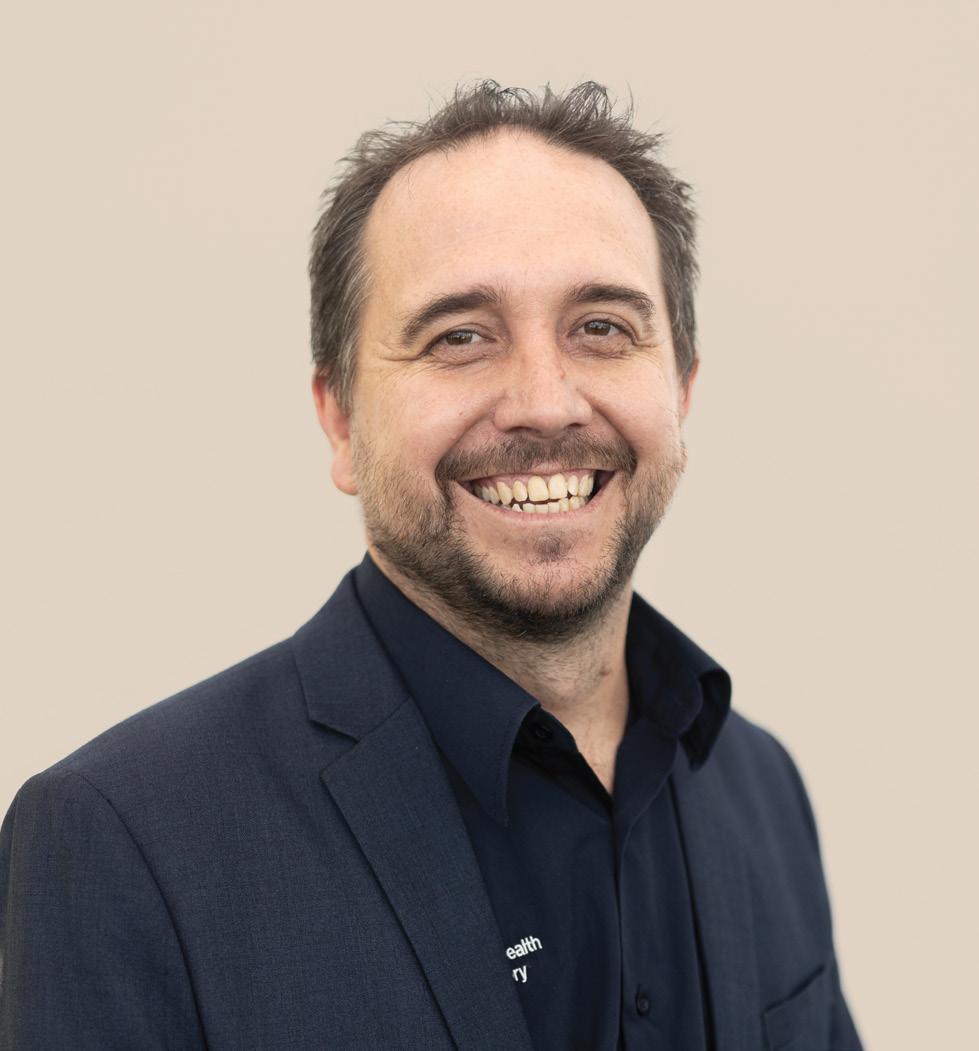
“We need more appropriately tailored and culturally-responsive health promotion and prevention engagement strategies with Aboriginal and Torres Strait Islander men, rather than an over reliance on the acute care system, when it’s often too late.”
PROFESSOR JAMES SMITH
“We need to really focus on the ways that we can engage with these men earlier. How can we make sure that they’ve got access to the right services at the right time in the right place?
“And we need to work with health services, and particularly Aboriginal community-controlled health organisations, to strengthen that approach and to change what that can look like so that men do feel comfortable in accessing primary health care services earlier.”
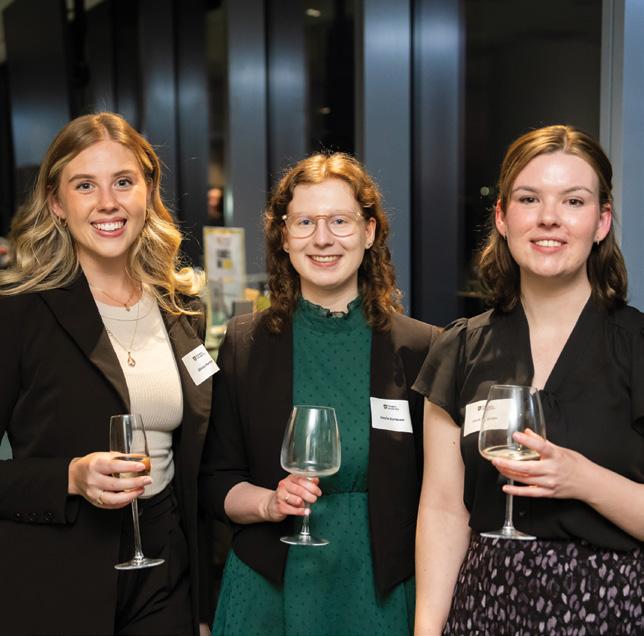
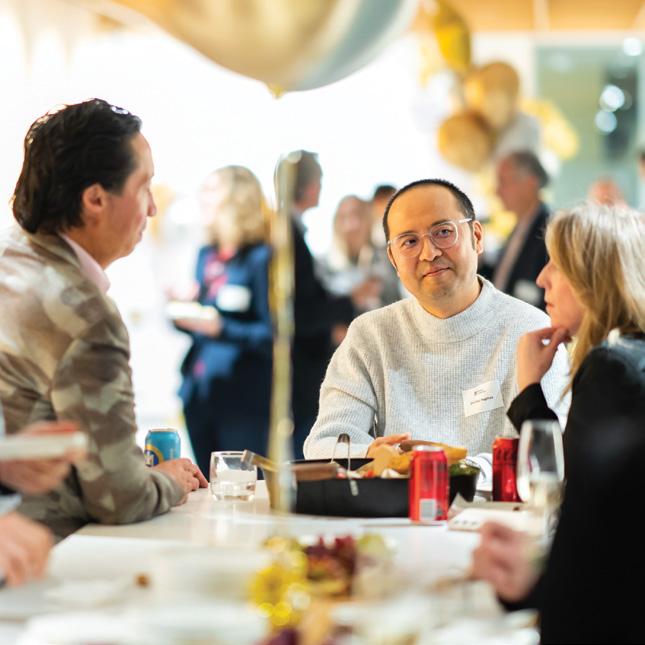
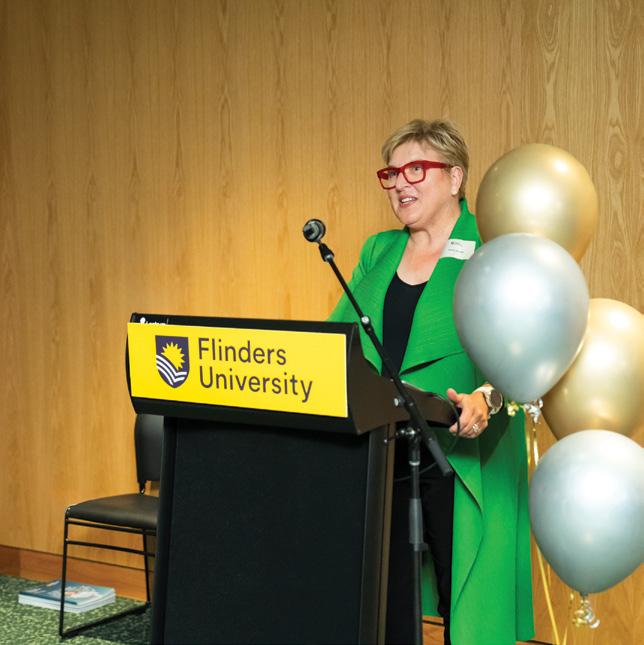
Flinders University Law alumni were invited to gather for a networking event with fellow graduates and industry partners on Thursday, 2 May 2024 at our new City Campus.
It was a fantastic opportunity for all, regardless of career stage, to connect with others in the legal profession and discuss the current state of the law in South Australia and afield. Guest speakers, Law graduates Fiona Brady (LLB/LP ’04) and Alex Giannopoulos (LLP ’06), shared insights into their career journey, highlighting their full circle experience of returning to Flinders. Fiona has recently been appointed Director of the Flinders Legal Clinic while Alex plays a pivotal role as Head of Engagement with Leo Cussen Centre for Law in the Practical Legal Training partnership with Flinders.
Interested in creating an alumni reunion from your cohort or networking event within your industry? Contact us to get the ball rolling! alumni@flinders.edu.au
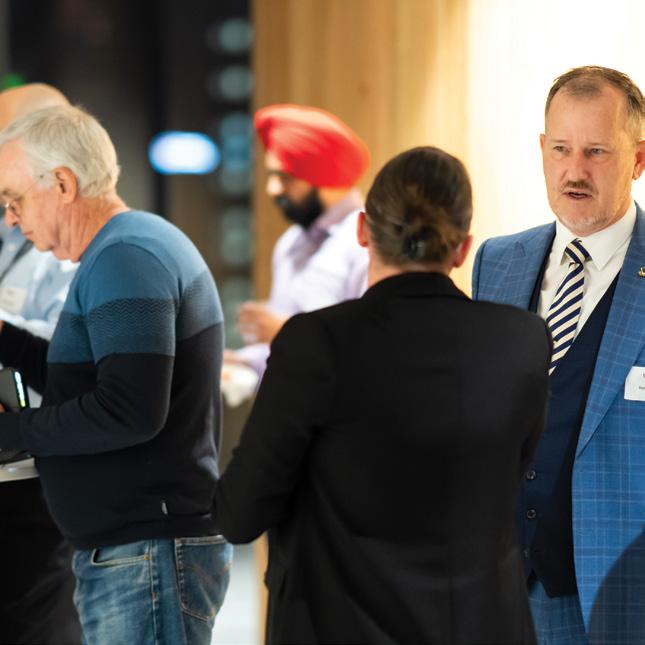
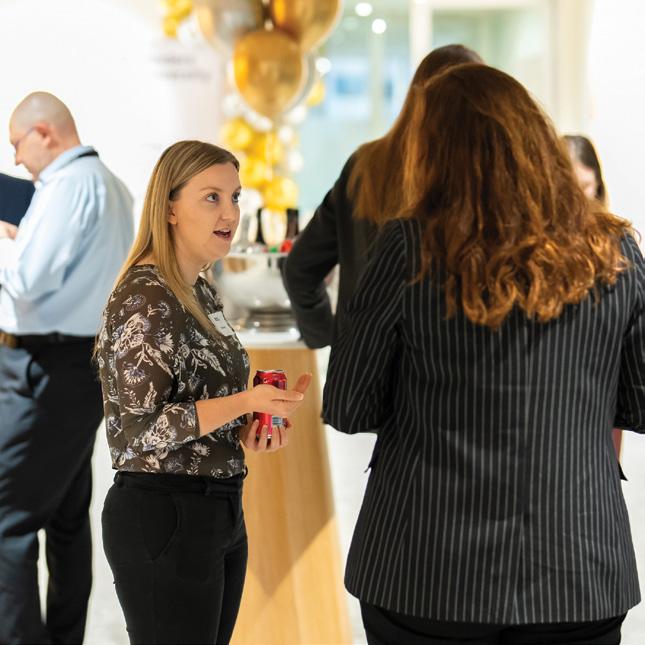
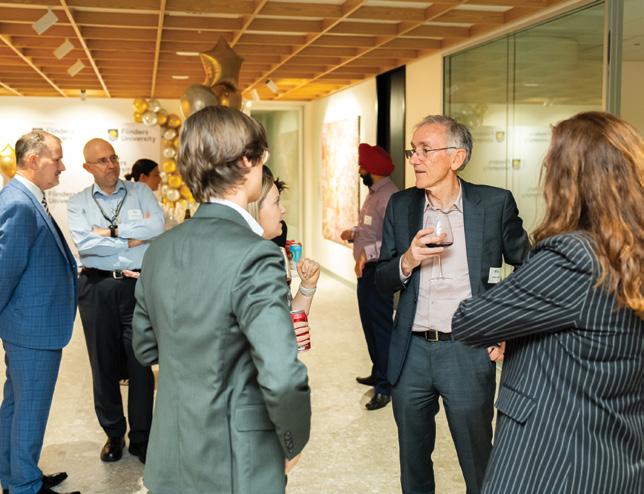
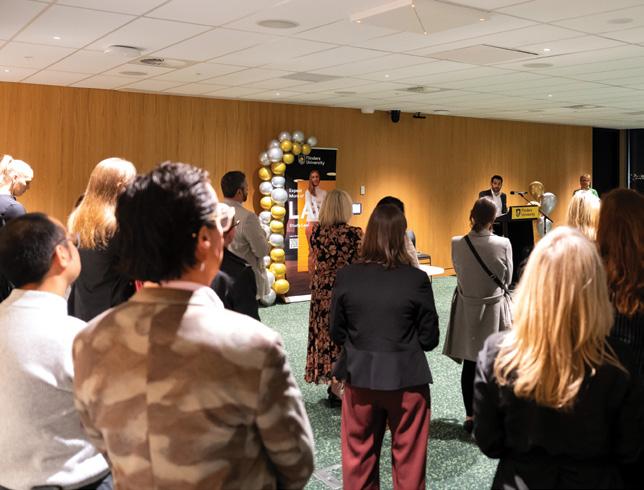
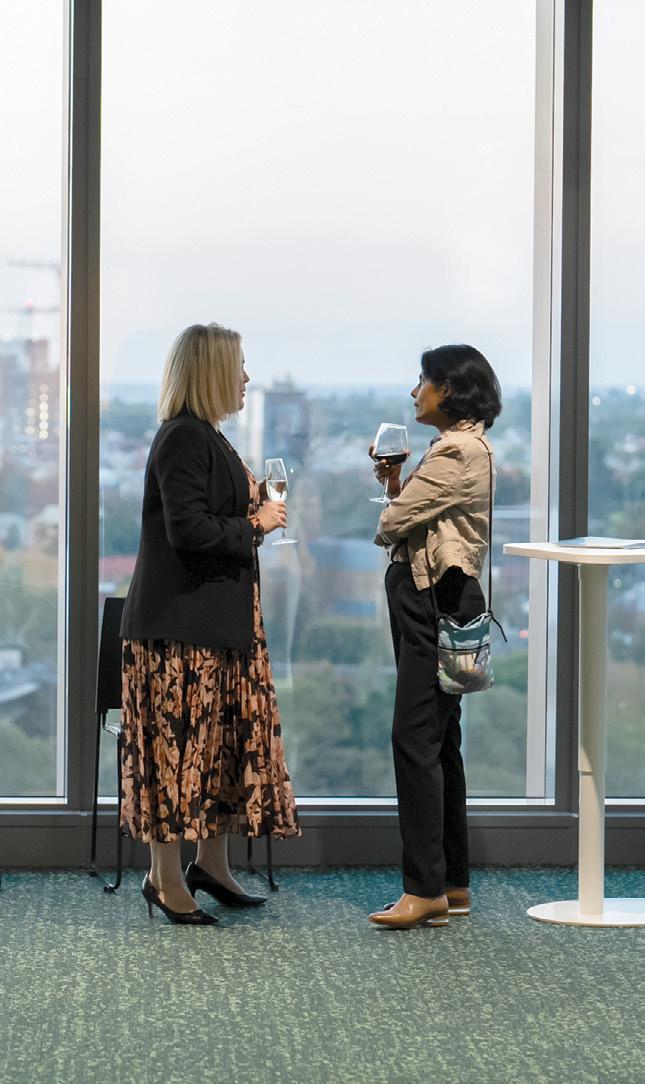
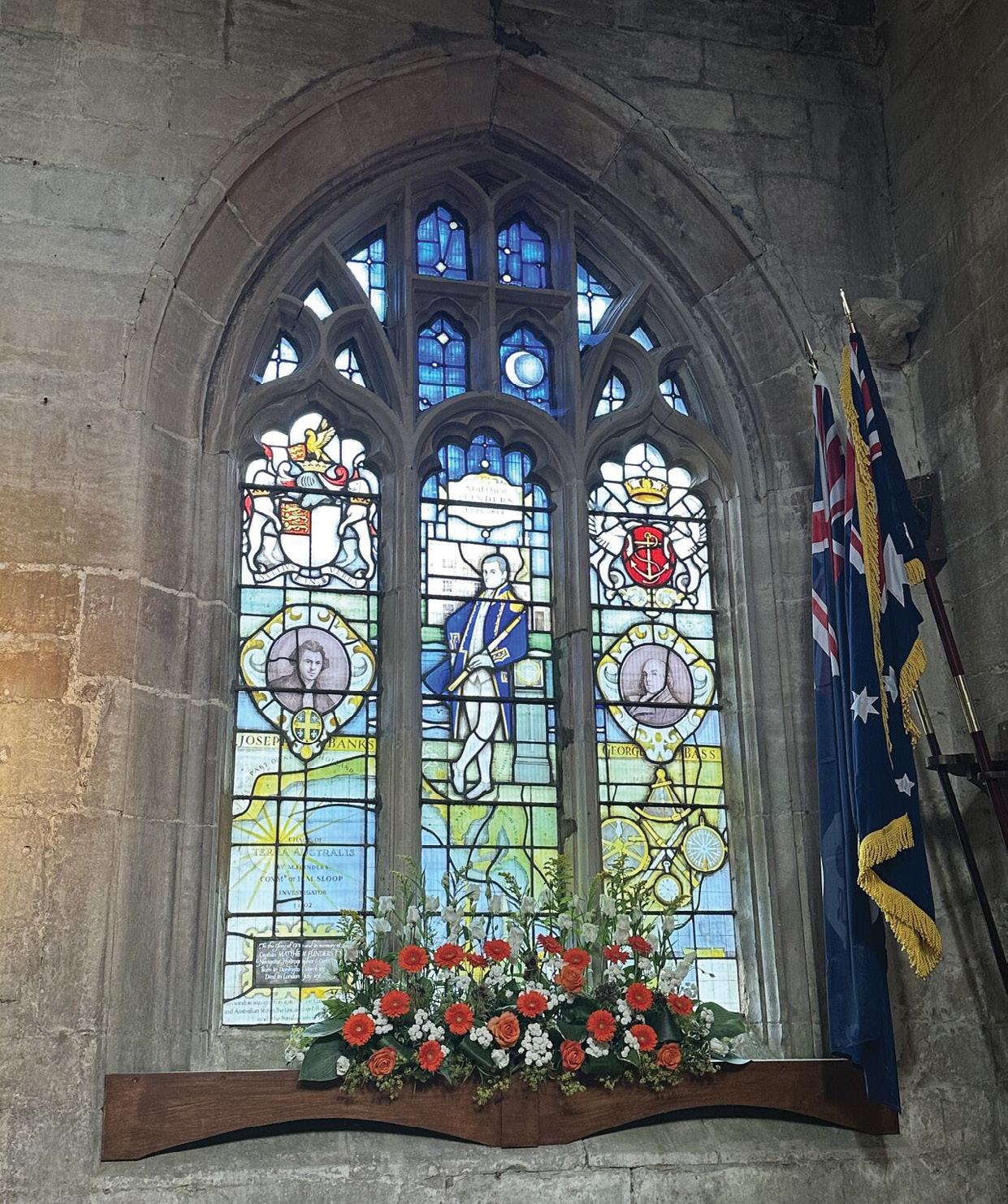
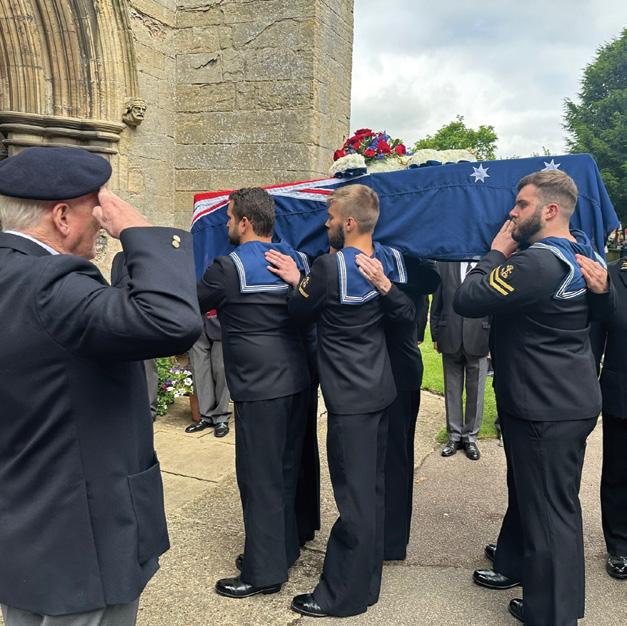
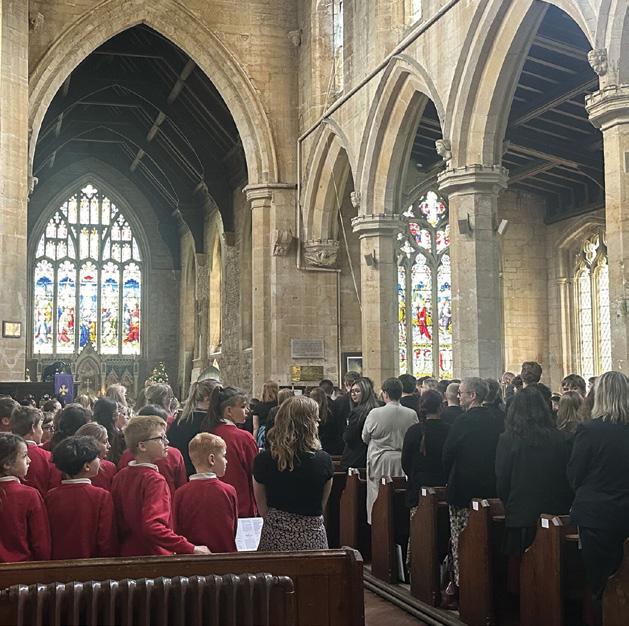
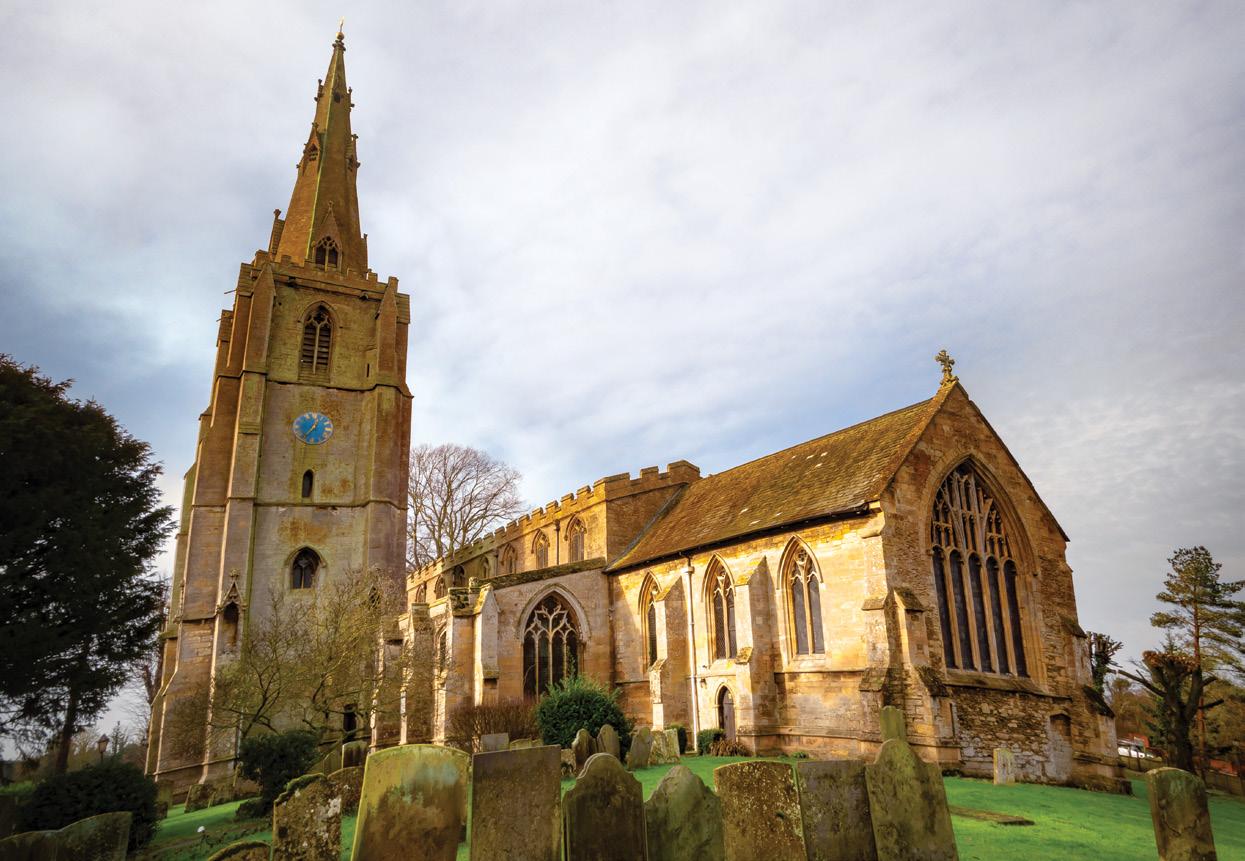
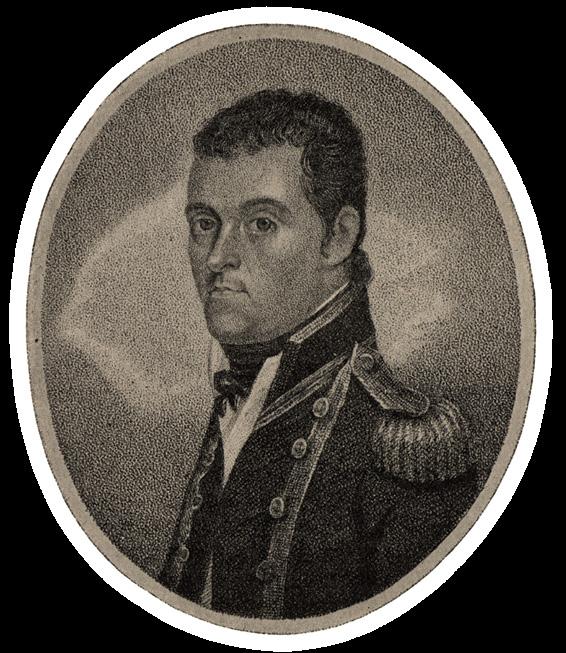
BY DR GILLIAN DOOLEY
Matthew Flinders was a great seafaring explorer, charting much of Australia’s coastline despite a series of trials and wild adventures. An outstanding sailor, surveyor, navigator and our University’s namesake, he was a considerate and selfsacrificing leader who looked after all under his command.
When Flinders died on 19 July 1814, he was buried at St James Chapel in Hampstead Road, London, near where he had been living with his wife and daughter. However, 50 years later when his sister-in-law visited the churchyard, she discovered that ‘the tomb had been destroyed’ during the development of the area, which is near the present-day Euston Station.
The exact whereabouts of his remains (and thousands of others buried there) were unknown until archaeological excavations were undertaken in preparation for a new train line in the UK. Against all expectations, Flinders’ remains were discovered, largely owing to the fact that he had been buried with a lead breastplate engraved with his name.
After much deliberation, it was decided that his remains would be re-buried in the church of St Mary and the Holy Rood in Donington, Lincolnshire – the village where he was born in 1774 and lived until he joined the navy in 1790.
The initial plans were to hold the ceremony in July 2020. However, the organisers realised that many Australians who would want to be present would not be able to travel during the pandemic, so it was postponed until Flinders’ 250th birthday year. Held in July 2024, the big event attracted guests from across the globe, including representatives of Flinders University, and was celebrated with a series of associated activities in the village and further afield.
There was also a special Evensong service in Lincoln Cathedral and an exhibition in the church in Partney where he was married in 1801.
Jane Pearson, the determined organiser, told the BBC that Flinders’ remains were buried not in the churchyard, where his father and other relatives are buried, but inside the church. “It was the first burial within the church since the 19th Century,” she said.
Jane added that “his grave will be marked with a splendid black marble ledger stone,” designed to match the other graves in the church.
Scan the QR code above to watch the reinternment.

Obtain your personal goals now
• 12-months accelerated option
• Choice of specialisation
• In the Adelaide CBD Book a Chat